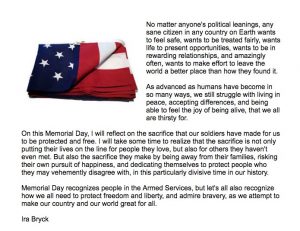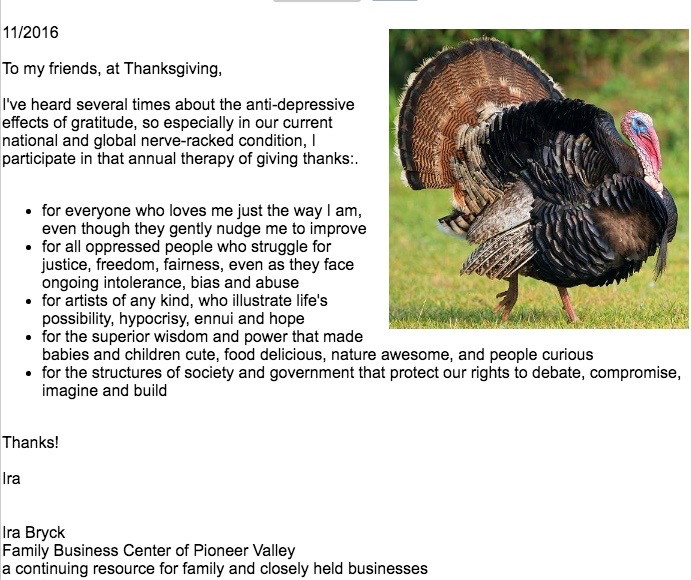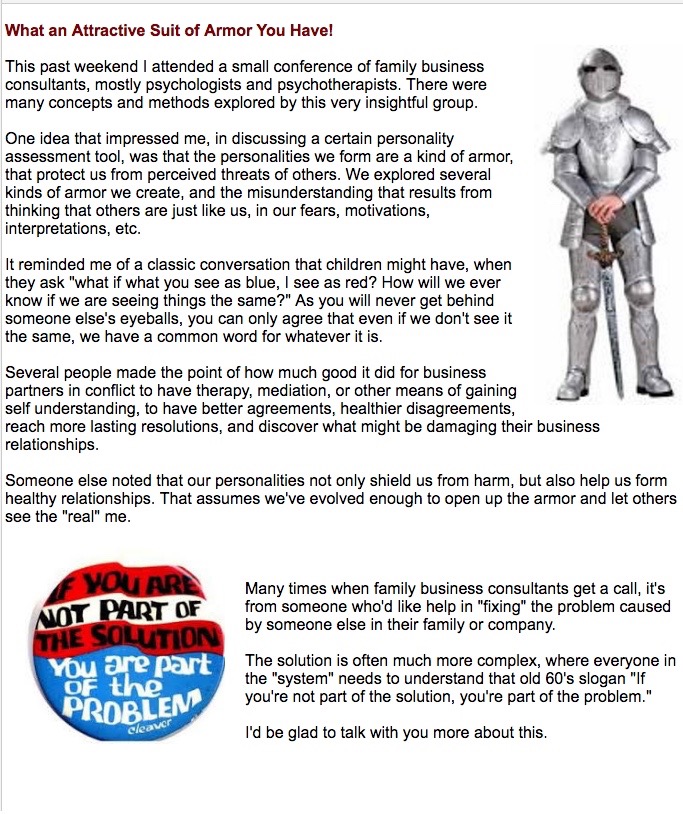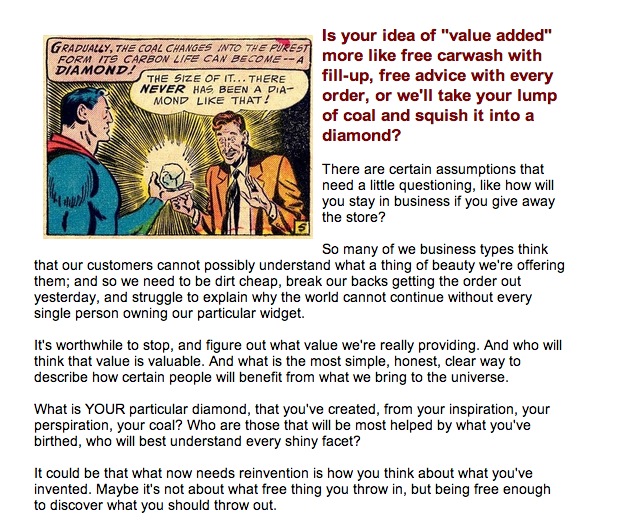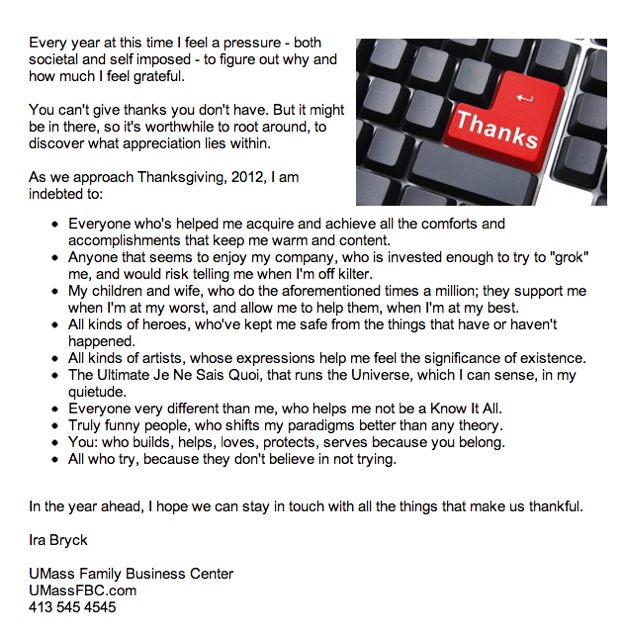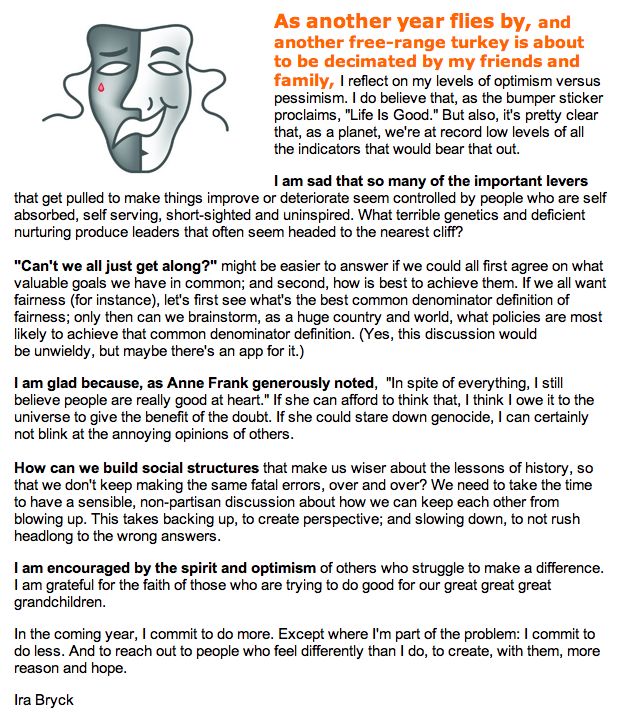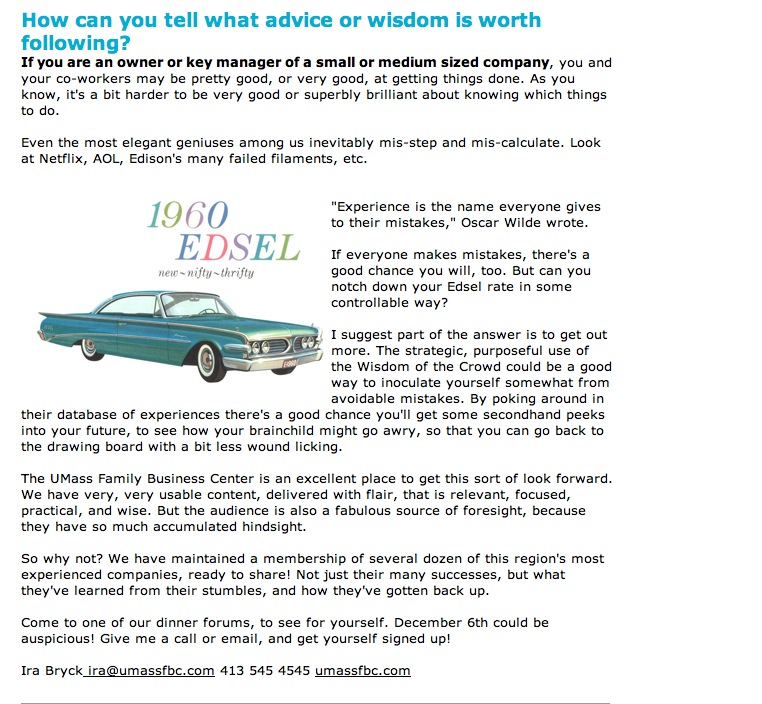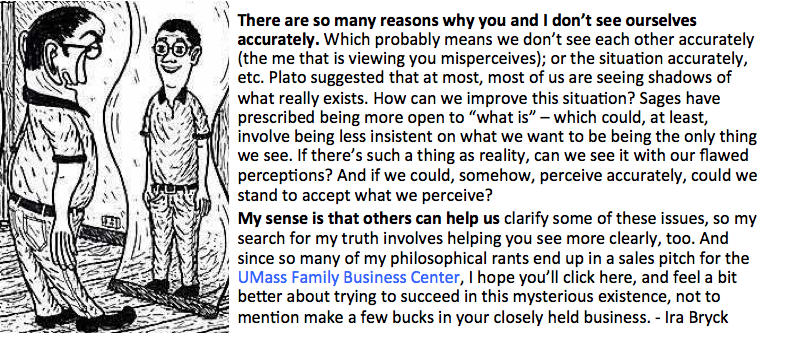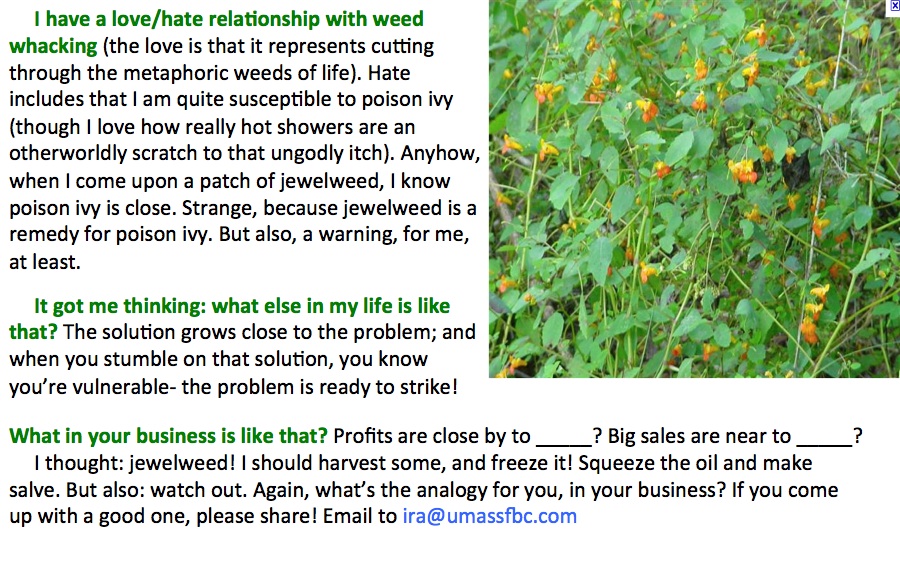PastBlogs
IF YOU WORK WITH FAMILY, how respectful are your disagreements? do you characterize one another (you’re always so cheap and shortsighted)? or communicate that you understand their perspective (you’re concerned about staying within the ratios in our loan agreement)? ARE YOU A MERITOCRACY (cream rises to the top) or a safety net (we must support the most unqualified among us)? IS THE COMPANY YOUR PLAYTHING (just charge it to the business) or are you a steward for the future (here it is, sharper than when I got it)? DO YOU LEAVE TIME AND SPACE for these topics, or are you too “busy”?
It’s not easy parenting adult children, especially if that incorrigible kid is YOU, and you’re attempting to become that mature, calm, resolved grown up who is so elusive, when you’re feeling plagued by immaturity; upset that your parents just didn’t launch you so great.
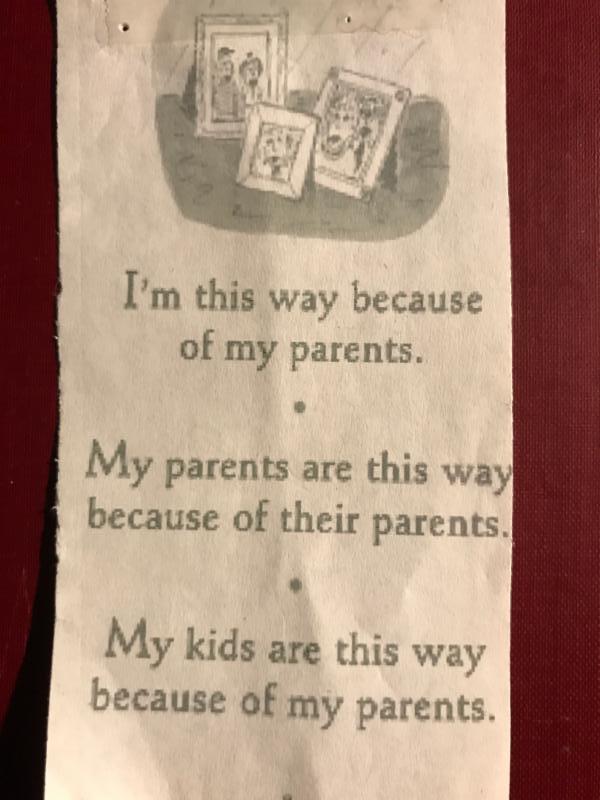
I’m glad to say I have some longevity genes going for me, so I look forward to the upcoming decades as an opportunity for continuous improvement, even as nature has its way with me.
 |
|
| “We only know what we’re told, and that’s little enough. And for all we know it isn’t even true.” |
InRosencrantz and Guildenstern are Dead, two men who are minor characters in Hamlet are the leads, and Hamlet the small part.
 |
|
| soul food |
Ira

Ira
A few years back I was helping an organization, and while I was just sitting and observing on the shop floor, an employee came up to me and said “It offends me that you say we should improve. It’s like you’re saying we’re not good enough.”
I responded that if there was something in my tone that sounded disapproving, I apologize. But also, if we don’t improve, we’d still be living in caves, taking turns keeping jackals away.
The idea of improving, if a dictionary definition means anything, is rooted in Old French and Latin for “make a profit, and increase the value of.”
So if a business owner isn’t involved in improvement, they will not own a business for long.
As I say way too often, every business has the same goal: solve your customer’s problem. But as others are also trying to solve that problem, your big job is to solve your own problem, that yesterday’s solution is so yesterday.
You don’t want to come off as hard to please, but if your employees don’t see you as a bit obsessed about getting smarter, cheaper, better, faster, they will soon not be your employees.
What do you do to continuously challenge your status quo? How do you get out of your own way, to see things through the eyes of a customer? through the eyes of a new problem solver? through the eyes of someone who’s starting over? through the eyes of someone with unlimited resources?
Can you dedicate a certain amount of time to get your whole team to 10,000 feet? To bring in a 4th grade class to suggest new ways of doing everything? To have a swap of employees from a company in another industry, to see how they see it?
To commit to having your key people partake in a business book reading group? Have a training exercise about starting a new and different company together? Perchance, become members of the Family Business Center of Pioneer Valley?
It’s a very normal condition to get into a rut that is good enough. It’s kind of the way our brain works, keeping us out of danger, keeping us safe.
But I invite you climb out of that rut, and would be glad to meet and discuss it. And I invite you to take a closer look at what we offer at the Family Business Center of Pioneer Valley. If interested, get in touch!!
thanks!
Ira
Your STORY is your BRAND is your PROMISE 
Who knew, when you went into business, that who you are and how you do what you do would constitute a promise to your customer, and they might choose to do business with you, or not, based on that.
So it follows that you need to be very aware of what that promise is, or how your customer perceives it, and what you’re doing or not doing to build that promise.
I say this every so often, that when I ran my family’s 4th generation store, that more than once a customer said to me “you know why we shop here? because we want to give YOU our money!”
I definitely make purchasing choices like that. I can buy books, shoes, toothpaste, meals anywhere. I want a good experience of doing that, unless I save 75% by spending my money with a real son of a gun. Even then, I don’t feel good about it. They say that rich people, who have every item they could possibly want, spend on experiences. But we all do. I want a better experience of buying a cup of coffee. When I’m in that endless cycle of “please pay me, so I can him, so he can pay you” I want to send my money on a path of people and organizations I feel good about.
So assuming that many people feel like this (who knows? I may be the only one), it’s worth your while to work on being that person, running that company, that is that brand, that promise, that story, that people feel good about.
In the end, it may earn you customers you feel better about. My father used to occasionally say to a problem shopper “I wish I had 10 customers like you… too bad that I have 30.”
Now that we are entering the season of Thanksgiving, here’s a short quiz
What habit should you really quit, cold turkey? 
And what makes it so hard to do? Does it have some weird payoff or comfort? What would be the hardest part to get used to, if you stopped doing something stupid or started doing something more effectively? Do people expect you to continue doing something that isn’t great for you or your company? What’s up with that?
With whom, and about what, should you talk turkey?
And why are you not, really? What would be the consequence of switching to a more honest and direct mode? Does it somehow seem safer to not be up front about what you have to say? Are you scared to hear what the other person would then be able to tell you?
What turkey in your life (or even in yourself) should you pardon?
What’s the benefit to you of not letting yourself (or someone else) off the hook, so they can live another day, be a better version of themselves (or yourself), realize that the way they were has outlived its usefulness? How would you then see yourself, if not as a guilty, shameful person? How would your relationship change, for better or worse, if you took your thumb off of their head, or your own head?
In competing with your company, what do your business opponents see as a turkey shoot?
Are you somehow complicit in letting them triumph so easily? Will you need to make a major shift or attitude adjustment to stop being such an easy target? Could you do business totally differently, if you no longer felt so threatened by that other company that forces you to be too cheap, too fast, too easy?
You may think there is no time for poking around like this.
But are you wasting time, energy, money, talent by keeping your nose to the grindstone? One reason there are holidays are to commemorate the important turning points in life, be they seasonal, historical, cultural, taking a deeper look at what it all means. Giving thanks, for instance, requires that you take a break from the treadmill and contemplate what’s happening all around you. Give yourself permission to do that, and enjoy the benefits!
When you are asked, later on in November, what you’re thankful for, instead of being stumped, or giving the same shallow answers, how about starting now to figure out what needs changing, so on Nov 23rd, you might say “I’m thankful I’m not the turkey I was in October; and here’s how I made the change!”
Thanks for taking the time to consider what I have to say.
Ira
Don’t Worry- Nobody Knows How Much We Fight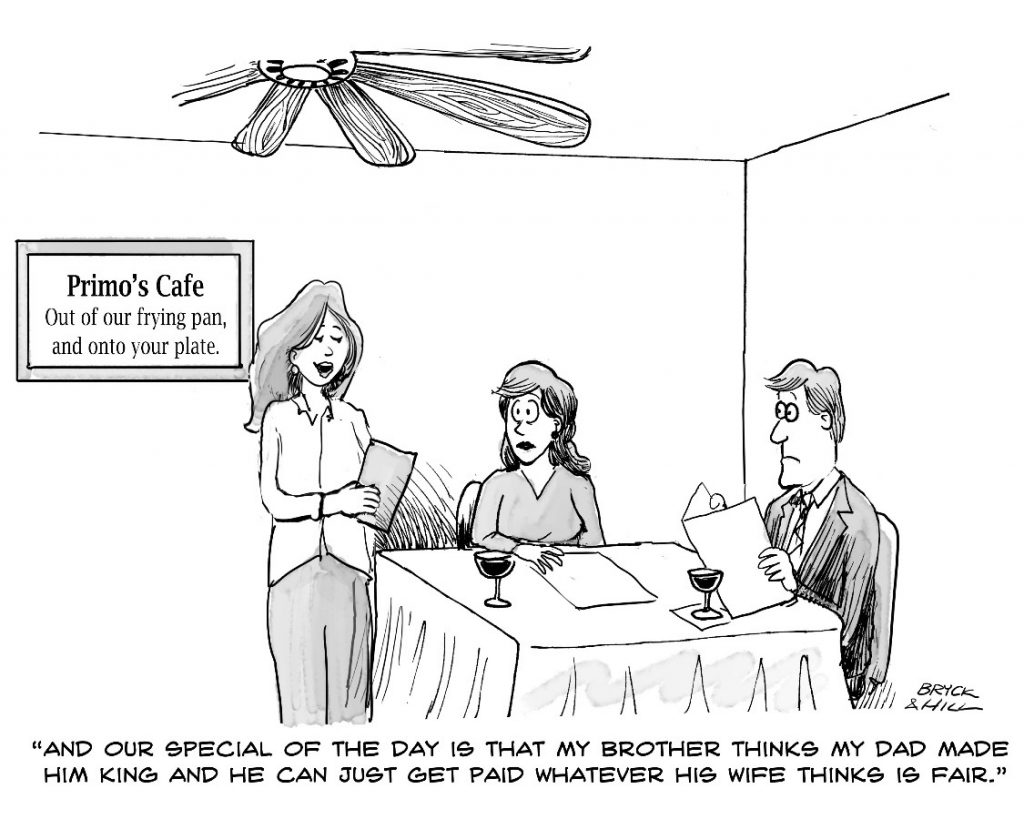
Last night I gave a talk to the Babson College Family Business Club (really interesting group) and in conversation, one young man talked about working for a company where the boss didn’t sit at the head of the table, listened carefully to everyone’s thoughts, very occasionally interjected with a subtle course correction, and respected the group, including that he expected them to “go deep” in their thinking and creativity.
As opposed to the too common experiences of the leader not being able to control the chaos, or at least not lead them to the promised land. The topic of the evening was how family meetings and family councils could make all stakeholders more aligned philosophically, more attuned how that philosophy would translate into decisions, how communication between the family and business would be clearer if boundaries, policies, standards, et al, are thoroughly vetted, massaged, and implemented. All this on top of how lucky your family may or may not be, to be imbued with good will, brain power, work ethic, patience, balance, joie de vivre, je ne sais quoi, and kop far gesheft (a head for business).
You can’t fake it till you make it with the vital ingredients to success, but trying your best at best practices is certainly going to get you further than letting it all hang out. Your employees, customers, suppliers, all expect you to control yourself, be your best selves, and practice doing your best.
You’d be wise to assume they see what you don’t want them to see, and they’d rather see you trying harder to create a workplace where they can thrive, and help you thrive. You will be their hero for making this effort. If this is not a competitive advantage, I don’t know what is.
I’d be glad to speak with you more about next steps your company can take. It’s inspiring to me to go behind the scenes with you and your people, and it starts with you giving me a call.
Thanks
Ira Bryck Family Business Center of Pioneer Valley ira@fambizpv.com 413 835 0810
 by trying to do hard things well. – Jeff Bezos
by trying to do hard things well. – Jeff BezosIra
- are you proud of the way your children get along?
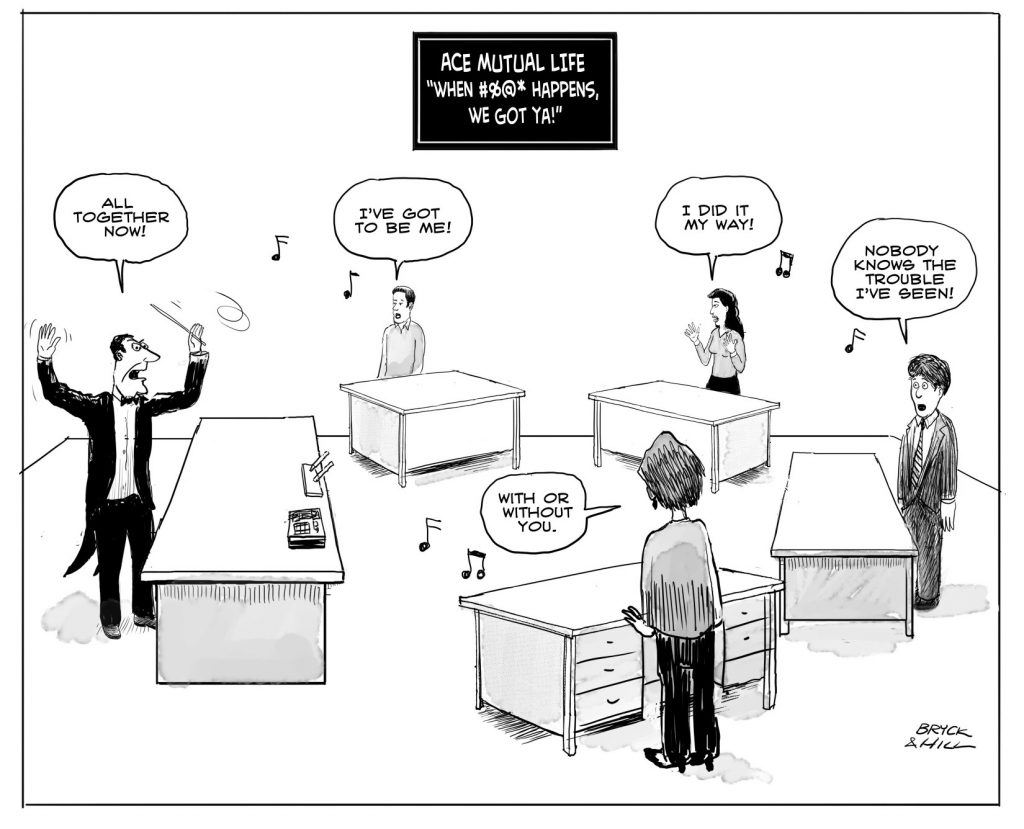
- if they don’t always, are you proud of the way they deal with their differences?
- if they don’t always/ ever deal well, are you proud of the way you respect their boundaries, so they can work it out, without you refereeing?
- if they are very different from each other, do they respect those differences, and work towards agreements that satisfy each one enough, and follow a “fair process”?
- if you happen to work with your siblings, or are the parent who works with multiple children, do you create a safe space to explore solutions, measure ideas, get comfortable with being a bit uncomfortable?
- if there’s a “my way or the highway” sense of things, do you discuss why you think your way is THE way, and hear others out, about how they don’t recall when you were crowned king?
- what is the “preamble to your constitution” that describes why working together is even “a thing”?
- is your ongoing conversation more “kill or be killed” or finding a “5 state solution” or “we can work it out”?
I have no end of questions. It’s one of my unique abilities. But another one is helping you come together and explore answers, solutions, remedies, treaties, agreements, or whether an order of protection may be in order.
And for families in business who are having trouble making beautiful music together, whether or not you’re currently members of the Family Business Center of Pioneer Valley, I’d be glad to meet with you and see if you can’t take a sad song, and make it better.
Ira Bryck, Family Business Center of Pioneer Valley
Ira



What purpose does your company serve, what promise does it make, that customers may not realize matters to them?


You THINK you know your family. But do they feel KNOWN?
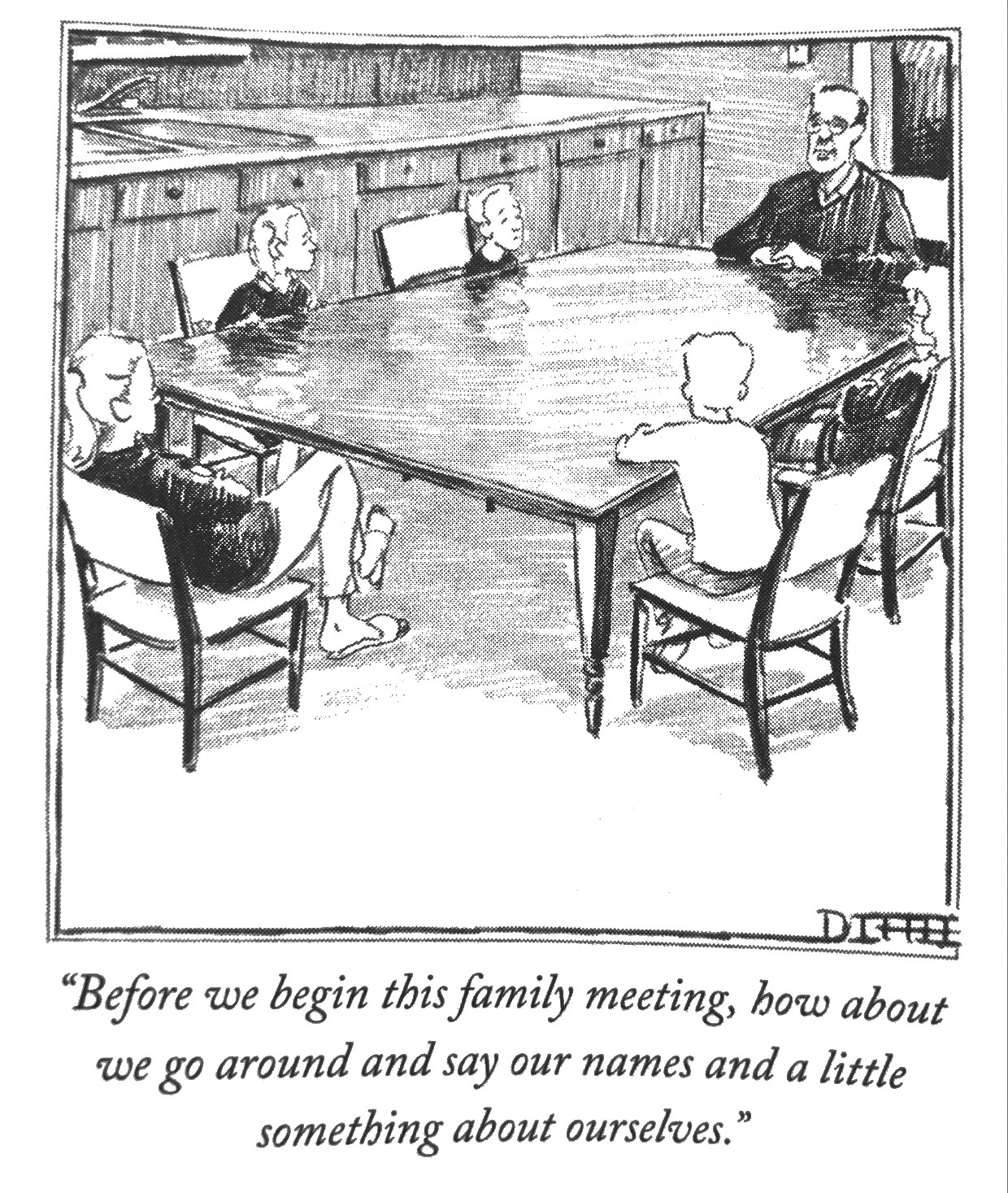 But as 99% of families are supposedly dysfunctional (can’t we get that down to 78%?) and included in that feel pressured to be a certain way, wouldn’t it be good if there was something you could do to relax, be supported, be accepted for who you really are; maybe creating enough free space for you to be the best future version of yourself?
But as 99% of families are supposedly dysfunctional (can’t we get that down to 78%?) and included in that feel pressured to be a certain way, wouldn’t it be good if there was something you could do to relax, be supported, be accepted for who you really are; maybe creating enough free space for you to be the best future version of yourself?- I’m a very unskilled liar, so what you see is what you get
- I hate the thought of my wife or children not being accepted by me, so I accept them, warts and all. Not that we can’t have honest talks about improvement, that is not shaming or blaming. And I prefer to call warts “beauty marks.”
- We are all fans of sitting around talking, “processing” everything. This is also very amusing to guests who occasionally get to see us in action.

- what qualities of your personality make you easier/ harder for others to follow?
- how can you communicate to your team, that will increase their ability to take responsibility, so you can reduce micromanaging?
- what do others need to know that will make their job more clear, that may also help them feel their job has meaning?
- what seems to stand in the way of people doing what you need them to do?
- how might your team mates get better at answering their own questions?
- how can you and your team get better at getting you up to 30,000 feet? (hint: listen this Saturday to interview with Eric Hagopian- see below)
- think of various leaders you have known, personally and by reputation, both good and bad, and consider what qualities made them so? (go beyond the obvious, ie: “strong! decisive!” and drill down a bit)
- how things are different in your generation of leadership and ownership
- balancing work and family, including how much do you have to see your family members, outside of work?
- how to deal with owners who disagree about the risk level that makes sense; how much growth is realistic and desirable; how to change that “I love same so I pay you the same” compensation strategy your parents loved so much
- how are you going to exit the business, if you don’t know who may be interested in being the next generation?
- how to expand beyond your core business; or get rid of all the stuff that is distracting you from what you do best
- how to have difficult conversations, because you’re pretty sure that what others are thinking is wrong, wrong, wrong
- what to do about the feeling that you’re burned out, and not loving it the way you once did
- you’re NOT a family business, but it kind of has the same issues, with your partner; or even if you’re a sole owner, still similar issues in some ways
- even though you’re unique, you’re sure you have much to learn from other companies; how to do that (learn from others, and implement what they did right)
Ira
- independence has to be earned continuously, as it seems to be the human condition that maniacs who lust for power will rise up and steal it from you
- when you achieve it, it doesn’t mean you’re not dependent, or interdependent… success in life, including in your own business, depends on collaboration, compromise, and sometimes paying in more than you get out, to support a society that provides opportunity to those who are disadvantaged
- there’s nothing wrong with appreciation (isn’t the 4th of July about appreciating?) which includes acknowledging: “nobody is smarter than everybody” and what Lincoln got right “the legitimate object of government, is to do for a community of people, whatever they need to have done, but can not do, at all, or can not, so well do, for themselves – in their separate, and individual capacities. In all that the people can individually do as well for themselves, government ought not to interfere” — ie: thank you for highways, libraries, armies, public schools, clean air, and everything society/ government does to support the success of entrepreneurs, who add hard work, vision, risk, money, but who would not succeed nearly as well without the interdependence of many parts and pieces, and each other
- that our country was founded by brave and wise people who took a chance to throw off oppressors, but had no way of promising that this wouldn’t be a continuing struggle. Democracy only survives if it’s supported every day.
Ira Bryck

Thanks

PS: and then there’s this other research, noting that in families that are socially and economically at risk, parents say about 30 million less words to their children than in wealthier, more privileged families… the study discusses the damage it causes, and what can be done to change ingrained patterns and sub-par parenting … this is a crucial understanding, and I don’t mean to take anything away from its importance and impact to at risk populations, by noting that it can’t hurt anyone to talk more to their children, even in the situation where you work with them in business. They will understand you more, and you them. As in habit 5: Seek first to understand, then to be understood,” talking more together will kill both those birds with one stone.
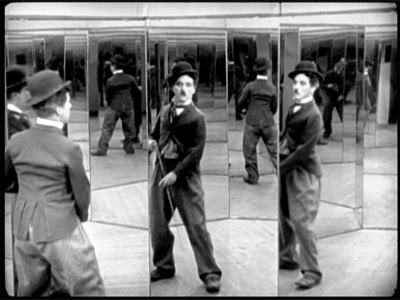 Research has shown that many people have their deepest thoughts in the shower. More proof that cleanliness is next to godliness.
Research has shown that many people have their deepest thoughts in the shower. More proof that cleanliness is next to godliness.
- when you are trying to be “true” to your “self” it helps to contemplate what part of your complex, evolving being you’re defining as “you”
- if you have to choose among all your characteristics and ways of being, why not choose those you think are your highest and best, and not settle for those descriptions you hear in your “self talk”?
- as per the Cherokee tale of the 2 wolves fighting; one evil, one good, and which one will win? (answer: the one you feed), try to realize that believing you are more truly the pathetic wretch you’re so familiar with is how you feed that wolf… it may seem “untrue” to feed the highest and best part of yourself, but to believe that you are your worst estimation is lazy, inaccurate and kind of egotistical, you jerk! FEED THE GOOD WOLF!
- Expanding it up a level, consider “to OUR own self be true” about your company. I’ve done many a SWOT analysis for small and medium sized companies, and depending on the collective self esteem, those assembled report either many more strengths than weaknesses, or more weaknesses than strengths. They are usually way out of balance. Either everyone tends towards overly optimistic and dismissive of their faults, or pretty sure that they suck! suck! suck! and it’s pure luck that they are still in the game; and that if customers, competitors, stakeholders lifted the veil, they would quickly stop doing business with you.
- The honesty, sincerity, clarity to see the good, the bad and the ugly is a valuable trait in a person or organization. And then the intelligence to strategically focus on what you want to be, selecting among your positive possibilities, attributes, potentialities, and the wisdom to know how to not feed the bad wolf, while not denying its existence while it withers away, will help you evolve to the person you hope to be, and can be, because you already are that person, to a greater or lesser extent. (imagine the mighty oak saying “what a little nut I am”)
- this is another way of saying focus on your strengths, etc etc, including your organizational strengths, as if it were an evolving person who needs a little TLC to be all it can be
- and also, try to be a person/ organization that seeks to know what it does not know, but from the standpoint of “we are not afraid to need improvement, so we embrace knowing where those opportunities are”
- this is not to say that it’s good to be one of those people who are oblivious about their shortcomings… if that’s you, you may only be able to tell by looking at the data, ie: how many people are continuously quitting your company for no apparent reason; how many people roll their eyes or snicker when you self appraise… but most people are not suffering from narcissistic personality disorder, and most who are will never know it
- this was a long shower, but a good investment of time and soap
Your word is your bond, your behavior is your brand, Abe Lincoln and dogs, and more 
Your cow may look a lot like his cow, so the differentiator could be the letters or design you burned into its hide.
Your product may look like her product, so the differentiator may be that you really seem to care about the customer’s experience, as a user.
You, as an employer, may look a lot like them, down the street; so the differentiator may be they way you treat your people with respect, for their rights, the terms and conditions, for their brains and feelings, so that they are the best they can be, working for you, more than those others that work for them (down the street).
Your brand is largely your reputation, and you can’t make that stuff up. You can hire a firm to create an image, but if that image is projected on a dirty screen, it will not be impressive.
Abe Lincoln said you can tell a lot about a person by the way they treat their dog. In Malawi, they say the true measure of a person is how they behave in their own home. I’m amazed at how people can’t fake how well or how poorly they treat servers in restaurants (probably they never think “I treated that person poorly.”).
If I wanted to be really sure about someone, I’d definitely bring them to a “dogs allowed” restaurant, set in a Malawian living room.
There’s a lot said about the “internal customer” and how your employees are important stakeholders. In doing market research about how you are perceived in the marketplace, about what your brand is, and what it should become, don’t forget that your reputation, therefore your brand, is only as good as your people think they are treated, considered, developed, communicated with, supported, loved.
Here’s an interesting short video on the topic of treating your employees right (as opposed to “the customer is always right” so should get the very best treatment) https://tinyurl.com/z78zzpp
Hope to speak with you soon!
Ira Bryck
413 575 5850
ira@fambizpv.com
Not a bad superpower: the ability to tap into the wisdom and experience of all the people around you
Ira Bryck
413 575 5850
ira@fambizpv.com
fambizpv.com
Ira Bryck
Do what you love?

fambizpv.com 413-835-0810


Ira

- if I ride my bike with no destination in mind, then I might meander onto some secret garden
- if I wander aimlessly around a library, then I might discover some obscure treatise
- if I randomly reach out to business owners in a disorderly way, then I might have conversations with people who eventually/continously create a diverse community for the Family Business Center of Pioneer Valley
 There is maybe little you needed to do to become the leader of your organization, besides start a company and hire employees. You thought “where can they each go, on an org chart, below me?” (Unless you started a mail room company, and hired everyone else to work above you.)
There is maybe little you needed to do to become the leader of your organization, besides start a company and hire employees. You thought “where can they each go, on an org chart, below me?” (Unless you started a mail room company, and hired everyone else to work above you.)- may not know what they don’t know, but are open and curious about how to know it, and the effect of not knowing it
- sees a part of their job as providing a healthy (and not hostile) environment, making sure the “right people are in the right seats,” and people are challenged in a good way (not frustrated, in a bad way)
- that the feeling of the workplace is more human than political, that leaders mean what they say and say what they mean
- that there is openness to reality, for example: how our business needs improvement, what threats we need to recognize, the seeds of truth of the grouches in the break room, that employees may want more work / life balance than you, and that’s not disloyalty or low work ethic
- that you need to have good reasoning behind the expectations that are set… “because I said so” may result in compliance, but not quality or dedication or enthusiasm or great employees
- that decisions are made logically, based on data more than gut feelings
- that you’ve built a meritocracy where what you say you want will result in rewards you said you’d deliver
- that the organization is run with sanity, goodwill, transparency, justice, clarity, curiosity, et al
- that leaders are humble, honest, calm, friendly, likable
- that employees get more from the experience than a paycheck. Freud said about happiness: “Love and work, work and love: that’s all there is.” They are hard to separate, good work is also about the love. You, as a leader, are heading up a little society, and creating a place that hopefully has its citizens trusting they can invest in the social good, resulting in a great company and a virtuous cycle.
At the dinner forums of the Family Business Center of Pioneer Valley, we gather business owners and expert  advisors who have many years of wisdom and experience. We hear great presentations, but a lot of the benefit is the “peer learning” that comes from sharing our perspectives. This happens serendipitously, when least expected; but also, through the occasional “prompted” or “curated” conversations, over dinner.
advisors who have many years of wisdom and experience. We hear great presentations, but a lot of the benefit is the “peer learning” that comes from sharing our perspectives. This happens serendipitously, when least expected; but also, through the occasional “prompted” or “curated” conversations, over dinner.
Not that tables of 8 interesting people don’t know what to talk about, when left to their own devices, but suggesting a way they may share some lessons and perspectives; and suggesting a format where a person is listened to a bit more “actively” has been very good.
I offer you some of the questions we’ve offered, or make up your own, to sit with your peers, employees, customers, etc. I’d be glad to talk with you more about guest facilitating a meeting for this type of discussion. Sometimes it helps to agree that the conversations can have “no deliverables” but also, you could conclude with “what might we do as a result of some of the ideas presented here?”
Aside from business, many families also don’t do this kind of thing much, and the conversations at dinner are random and unfocused (maybe with the rare exception of “what am I thankful for?, this being Thanksgiving” – and hopefully that’s not met with snarkiness). May I suggest that families try this kind of thing more regularly? Research shows that families that eat dinner together do better in many ways. Imagine if those occasions helped you get to understand and appreciate each other more and better!?
- What kind of customer we have a hard time winning, and what we might do about it.
- How we identify and treat our “high potential” employees.
- How can we give our company more of a “family” feeling?
- What problems of ours do we never get around to solving?
- If I needed to get out of my current line of business and do something else, I would…
- What I would never do just for the money (in my company).
- The big change I’d make, if the odds were great it would succeed.
- How I work around my biggest shortcoming.
- What special sauce helps us win customers and work, aside from price, quality, service.
- My most effective time of day, or work habit, or other method or style, and what I do to take advantage of it.
note: feel free to use this idea, and these questions as you please, but it wouldn’t hurt to note that I thought of them.
Ira Bryck
Ira
GOOD TIMES, BAD TIMES, YOU KNOW I’VE HAD MY SHARE
In a previous chapter of my life, I ran my family’s 4th generation childrenswear store on Long Island (if you know me at all, you know that … Want to see my play about it? click here)
It made me proud, on good days to continue a legacy, to do business with solid, honest policies and principles, to be a decent employer, to have pretty gratifying relationships with customers, employees, suppliers, even many competitors.
On other “workaday” days, I thought: since I was not part of the solution, I must be part of the problem; that I was just hawking a commodity; that my business and my work did not fulfill my purpose; that since I’d never be absolutely the fastest, best, cheapest, what’s the point?!
I no longer sell clothing, I help educate leaders!! … but I still have the same sorts of swings, from “I’m making a difference!” to “same manure, different day.” Both of those perspectives have an undeniable truth to them, so there’s no escape. But I prefer the first one.
But I’ve experienced that I can affect the ratios, by trying new things, challenging myself, rethinking my goals and purposes, and having interesting interactions with people who are good thinkers and feelers. By leaving it to chance, it’s more out of my control when the fun will happen. Also, I find it an interesting paradox that it helps me to help others. This is most apparent to me when I participate in one of our roundtable groups, and everyone is focused on asking thought-provoking, strategic, questions to the person taking a turn at describing a challenge. Or just with a friend, when I put effort into listening well, and helping both of us understand what’s happening on a little deeper level. Or when I explore how, in a working relationship, I can assist the other person to do a better job. Or when I just give myself permission to be my best self, instead of going on auto-pilot. Or when I join in a conversation with a management team about how they can change course, look at the bigger picture, do the right thing, commit to an exciting risk, etc etc…
I was raised in the soft goods business, selling “schmatas” for a living… and now peddle ideas, discussion, processes, improvement for a living. It’s just as easy to be cynical about the “flavor of the week” management practice as the new season’s fashions, but it’s exciting for me to help people running companies – the jargon and system is secondary. Helping them help their workforces feel more meaning in what they do. Help them create environments that stimulate innovation, that help people make more of themselves. Help supervisors and subordinates come together as one, as people.
Many business owners I know didn’t bargain for having such a significant role in the lives of others, and are surprised that it’s the most satisfying (even if most challenging) part of their work and lives. It’s good to hang around people like that, as the lessons they learned are contagious. I’m proud to be part of that contagious environment, and invite you to join it. This is an essay about my experience, and not an ad — but… for a good time, call me at the Family Business Center of Pioneer Valley.
Ira Bryck
what kind of camaraderie could help you?

As Abe Lincoln said: “Give me six hours to chop down a tree and I will spend the first four sharpening the axe.” This group is only 3 hours, but you’ll come out much sharper.
Consider the proverb “a stitch in time saves nine”
Ira Bryck 413 835 0810
Family Businesses Without Conflict Resolution Strategies
How are you similar to so many other business owners in Western Mass (and beyond)?
- the business they started often was not where they were headed in their education and training
- they discovered their leadership style on the job, and was different than how they conceived of “what a leader does”
- the business goes through cycles of expanding and getting back to your roots
- employees are hired for character and trained for skills
- owners have great pride in the workforce they have built, and credit their success to how well they’ve done this
- if a family business, family members need to measure up to the same standards as everyone else, or suffer from the resulting lack of respect
- there is never a feeling that what you provide is “good enough”
- the successful sale of the company is a popular exit strategy, but it matters a lot that the next owner will continue the values and legacy
- there is no end of hard work, but it’s what you love to do
- it’s a continuing challenge to balance being at 10,000 feet and at the front line, and bringing the wisdom of each back and forth
Many of my guests have put a link, or downloaded file of the interview, on their website- this could be a great promo piece for you and your company!
Many business owners describe what they do (no matter what they actually do) as solving problems for their customers.
 You may be solving the obvious problems of too high price, too slow service, or too poor quality. But how are you edging out all others who can match or beat your best offers?
You may be solving the obvious problems of too high price, too slow service, or too poor quality. But how are you edging out all others who can match or beat your best offers?
Are you also more pleasant, reliable and trustworthy? More simpatico with the culture and systems of your customer? More proactive in solving tomorrow’s problems today? Clearer that your perspective on being their supplier is “su problema es mi problema”?
How can you make your case that these added qualities make you the best choice, even if they can’t quite be measured, monetized or proven?
How can you communicate the importance of all those extra miles you’ve gone for them? Of how they will sleep better with you having their back? Of you understanding their business so well that there will be fewer fires to extinguish? Of you being a partner that makes them more impressive to their customer?
You can’t promise those benefits unless you can deliver. So what can you and your company do to develop the empathy, the diagnostic skills, the exuding of confidence, the fortune telling abilities, the fire proofing talents, to earn the ranking of trusted advisor, instead of a commodity supplier?
Invest the time to make your company superb problem solvers, as it can be the secret weapon to withstand the onslaught of companies that are a penny cheaper and a minute quicker. Role play being your customer, doing a swot analysis as them (invite them in to hear your thinking). Have company trainings that explore cases where problems were solved or not. Hire people who love taking things apart and putting them back together. Search for your own suppliers, advisors, and employees who are gifted at sensing what your company’s problems and solutions are and will be.
Then collect testimonials from customers who describe why they stick with you.

One benefit of being in the company of smart, observant, honest people is that useful feedback could keep you informed about how you are impacting others, and help you to more clearly see and deal with all sorts of challenges.
At the same time, we are not all talented or well trained about how to deliver our helpful “truths” and many of us have an iron fist and a glass jaw.
In delivering our perspectives, it’s easy to be more direct than is required. We might think it softens a swift kick to the tender regions with “I’m just saying” or “I though you deserved/ needed to know.
And that’s assuming we’re well intentioned. As Tennessee Williams put it, “All cruel people describe themselves as paragons of frankness.”
In our roundtable groups, we try to be most helpful by listening attentively, and asking good questions. We start with clarifying questions, to increase the odds that we understand the root of the problem. This also helps the person describing the problem, by guiding them to fill in parts of the story they may not realize are relevant; or realize that the problem might be different than they first thought.
Then we ask strategic questions, which help probe further, aiming to dislodge old ways of thinking about the issue, and uncovering new and hidden options and opportunities. Strategic questions tend to start with the more positive “how?” than the narrower “why?” (How would you get paid for that? instead of Why do you think that would sell?)
Then we move on to stories of when something comparable happened to us, and how we handled it. This gives choices of several perspectives to consider, without having to sort through all the “shoulds” that accompany even well meaning advice.
It’s great to have people who are willing to go out on a limb to tell you the truth. But it depends how it’s delivered. We need oxygen, but it’s only 21% of the air we breathe. We need vegetables, but they are much better for us when the dirt is removed.
We need truth, but it’s much better when its delivered tactfully. I know for me, I have a lot to learn about how to actually be helpful when trying to be helpful. It’s been helpful for me to be in the roundtable environment, where a few simple rules, sometimes restricting us from “doing what comes naturally” helps to turn frank strangers into trustworthy colleagues.
In What Manner May We Serve You?

Having worked in my family’s retail business from a young age, there was a question that I heard and spoke many thousands of times before I thought much about it: “Can I help you?”A too-large percentage of the time, the answer I heard from customers was some variation on “No – just looking.”I suspected that even if they did need help, they didn’t want to be pushed, and tended to answer that yes or no question with a knee jerk “Leave me alone!”My father in law, also in retail, of Cuban descent, mentioned to me that the more polite way to ask a Spanish speaking customer that same question was “¿En que’ le podemos servir?” meaning “in what manner may I serve you?”In my rudimentary Spanish, I noticed that I heard “no” much less in response to that question, and started using the question “How may I help you?” in English. It may have seemed ruder to respond to me “No way may you help me” so instead, the customers explained what they were looking for. I made it a new rule in our store: no more “Can I help you?” even though the new phrase was so very slightly different.Aside from the words, I realize that I am (as you are, as we all are) in the business of discovering what the customer’s problems, confusions, objections are, and offering clarifications, solutions and assistance. If your customer feels your sincere desire to help in your sincerely expressed “in what manner may I serve you?” they may be more open, even more creative, in figuring our what problems you may solve.Even with internal customers, that desire to serve goes a long way. If you, the boss, sincerely expresses to your employees “how may I help you?” you may get the employee thinking more effectively about how you can get the most out of them, by them getting the most out of you.Just this morning, I met with a young woman who wanted to pick my brain about how to better serve her clients. It was a good discussion, and she sincerely seemed to appreciate me helping to think about her business. After, she said something to me that I think many fine people have said to me: “and what can I do to help you?” It had a sincerity that stuck out, and it made me think “Yes, what CAN she do to help me?” We came up with a good idea that will be mutually beneficial, and you will soon be hearing that she (Angela Lussier) will be facilitating a new roundtable discussion group of women entrepreneurs for the UMass Family Business Center (to state the obvious: how she helped me also helped her- good for both).
The Informed Family Business Child

21 years later, those aging “next gens” have had many second thoughts about whether to bring in their children. Not that it isn’t still happening, but it’s no longer as automatic or assumed, in my opinion/ observation.But it doesn’t seem that entry requirements have been tightened or implemented so much (aside from the popular 3-5 years of outside experience, before joining). The decline in the next generation entering seems more about the parents’ soul searching, a la “Do we want to continue this as a family business, or should it end with us?” “Should we build it up and sell it?” “Is this the highest and best choice for our children, in a world full of opportunity?”Then, when the next generation is brought in, there is often the usual confusion. “Must they start in the mail room?” “Do they get any head start, because of their family status?” “What if they don’t like it here, or we think it’s not working out?”More clarity is needed about why the next generation should be offered a spot, aside from “because it’s there.” My suggestion is start a thinking process early, assigning your teenage children a research project, to explore everything they need to know about their family’s business, with no foregone conclusion that they will one day become a part of the operation.The rationale for this assignment could be as simple as: we want our family to be aware of what it means that we own a business. We want the input and perspective of the next generation about business continuity. We want you to examine the pros and cons, so there is no regret about deciding unconsciously, about one day feeling trapped, about the business becoming a safety net for the least qualified, rather than an opportunity for those with talent and passion, about our family being the best stewards of the company.The end product that your young researchers would create could be a report, or a film, or a series of interviews, or a SWOT analysis, or a study of policies of several comparable business families. It could be academic or creative. It could be presented during a family meeting or retreat; or to a board meeting. It could be updated over time, it could be required for any family member that has any inkling of partaking in ownership or management when they reach that decision point. Or just what you insist your children participate in, as an exercise in family citizenship.Consider the benefit of your children being so well educated about your family business that they are making as informed a decision as possible to join or not join.This would help avoid the unfortunate situation of your children entering the business by default, as the convenient option. It would reduce the chances, decades down the road, of them thinking “What was I thinking?” It would become a process where only the most interested successors would discover, on their own, but in a strategic conversation with you, that your family business is their best path forward.
Time to Not Make the Donuts

And even when you do have deep thoughts, whether in the shower or mowing the lawn, do you take time to share them with others who could help you actualize and execute one every so often?Many of us are so dutiful, we never stop doing those things that make sense to do.But how about put on that list “hang out at 10,000 feet with my significant others”?How about go out to dinner with your business partners, where the rules are “no practical matters on tonight’s agenda”?Come prepared to discuss philosophical, hypothetical, no deliverable questions. Make up your own, but here’s a sampling:
- What might happen if our biggest competitor suddenly shut their doors?
- What could a day in the life of our business be like in 100 years?
- If you sold your company, had a non compete, but wanted to buy another company in another industry, what industry, what specific business, would you choose, and why?
- Which celebrity would be the most effective and amazing spokesperson for your commercials, and what would they say?
- How would you sell your product or service using only mime or your own style of sign language?
- What are the best aspects of your business because you’re family owned (if you are)?
- What looks better about our business at 10,000 feet, that we need to make better on the ground?
- How would I run this company if I was never again able to come in to the building?
He’s not heavy, he’s my partner

Mi kidney es su kidney
Family businesses can be roughly categorized into those that are “family focused” or “business focused.” Those that are more focused on business goals generally have less conflict about which family can or can’t work in the business, the future strategy of the company, performance of family employees, and which family member (if any) is most qualified to be the next generation leader.
They have clearer performance indicators and more strategic discussions, and one might conclude that since they are more business-like, they have less family “feel.” But consider that only 1% of the time do family in “business first” companies feel the need to leave due to unresolved tensions. In “family first” companies, 85% of the time family members are frustrated enough to consider quitting.
The ability for family members to be direct and objective with each other is a huge competitive advantage in business. They don’t need to say “don’t take it personally” as much, because they can more easily separate what it means to be a loving, supportive family from what it means to be a driven, goals oriented company.
Direct and objective doesn’t mean tactless or mean. You are measuring performance and, as they say, if you can measure it, you can manage it. If you’re clear what you’re measuring, you can better manage to not let irrelevant judgments creep in. An unreached goal is just an unreached goal, and not a personality defect. Acting professionally allows for more family warmth than acting unprofessionally.
F. Scott Fitzgerald defined a first rate intelligence as the ability to hold two opposed ideas in your mind. So see if you can get your head around “If you ever need a kidney, I’m there for you; but you didn’t earn a bonus this year.”
As an exercise, by yourself or with relatives in business, list and discuss several values in business that are different from values of family, and how you can sincerely express both. Family business is a juggling act in the best of circumstances. But that only means the successful ones are good jugglers.
5/7/15
Are Big Best Practices the Best for Your Small Company?
Over the years, I’ve asked several audiences of owners of small and medium sized family businesses to raise their hands if they use an outside board of directors to get objective advice for their company. In many audiences, not a hand was raised; and everyone felt a bit comforted that they were not alone.
But the ones that do raise their hands, when questioned, say they feel even less alone, able to pick the brains of people with a bigger perspective, who are there to help think things through. They say they don’t suffer from what others fear, of having a bunch of people who don’t really understand their business giving irrelevant advice in a controlling tone of voice.
A recent study of the 500 largest family businesses in the world report that 90% have a board of directors, and 87% of those think that their board is doing a good or outstanding job. That must include owners who have their gut feelings challenged, cold water sprayed on their brilliant ideas, and who are not afraid to question authority.
Clearly the board members of a company doing billions of dollars will look and act differently than a machine shop with 23 employees, but what they will have in common is an agenda relevant to the needs of the business, and perspectives and experiences that can help guide decisions on growth, succession, change, leadership and a gathering of people whose wisdom you trust, or at least respect.
There are ways you can slowly get a taste of what an outside board of directors can do for your company, starting with joining a roundtable discussion group, where the members serve as informal advisors to one another; or gathering together a strategic group of advisors for a one time meeting of an ad-hoc board. This is also a good audition for specific people who you might invite onto your more permanent board. You can slowly evolve from a roundtable to board of advisors to a more formal board of directors, as you get comfortable giving up full control to others who can help you steer.
There are other results of this survey, done in collaboration between Joseph Astrachan, eminent family business research scholar at Kennesaw State in Georgia, and Ernst & Young. They also speak to what large companies tend to do, that small companies would be wise to emulate, customized as appropriate. Among the results:
- >87% have clearly defined who has the responsibility for succession planning
- family members must work outside the business before joining the company for an average of 3 years
- branding your company as a family business improves your reputation, differentiates you from the competition, and helps your family identify with the company, says 2/3 of respondents
- conflict in the family is greatly reduced by regular family or shareholder meetings to discuss business issues (says 90%); and family meetings to discuss family issues (says 70%)
- 70% are considering a woman as their next CEO; 55% have at least one woman on the board (still more CEOs named John than CEOs who are women!)
What can you learn from those who’ve “been there, done that”? (Apr 2015)
This past Sunday I was glad to be included on a panel of several people in the world of business, who each shared their experiences and perspectives with a group of high school seniors. It was organized by Rick and Ross Giombetti, who’d been meeting with that group since they were sophomores, helping them become more self aware and consider what it will take for them to be happy and productive in their careers. 
Numerous themes emerged from the diverse stories of the panelists, that I think were instructive to the students, and reinforcing to the panelists, as well. I share some with you, as food for thought, no matter how long since you’ve been in high school:
- Always be building your relationships and networks. There is no telling who might be helpful to you, or who you might be helpful to. But instead of asking for their help, it’s good to ask “what can I do to help you?”
- When you see a problem or something that’s broken, instead of complaining, devise a solution. Nobody wants to work with, hire, or promote negative people.
- Everyone will have failures in life. It’s not a matter of avoiding failure, as much as being able to continue on to the next opportunity.
- What you’d like to tell someone when you’re treated unprofessionally or unfairly will not be as helpful or satisfying as acting professionally.
- You may have many chapters in your work life, and you might find yourself in a field or function that you had no clue you were headed to.
- You need to stay vulnerable, and open to learning, and thankful for feedback, even when it might sting. The response “yes, but” will never work for you.
- No matter your field, it would be good to know how to code software.
- Always bring a paper and pen to meetings. If you must take notes on a device, clarify that you’re doing so, and not texting friends, etc.
- It’s good to get to know people who are outside of your cohort/ demographic, to learn more about the world outside your comfort zone.
- Self awareness is a powerful tool, to know what your strengths are, but what needs work to overcome your weaknesses.
- What a person does all day in a given field is different than you might imagine. Have informational interviews with a wide variety of people, to see what their actual experience of their work is like, so you can make a more conscious choice for yourself.
- Seek out people who can mentor you. You might be surprised that excellent guides will say yes, if asked by an eager and sincere mentee.
If some of these feel basic, consider the Amish expression “Too soon old, too late smart.” It takes a lifetime to develop the common sense that would have been so valuable for the younger you. As much as I thought this session was great for high school seniors, there is not one point that was made that I didn’t want to ponder more. I am grateful for the kindness of strangers, who are now colleagues.
Thanks, Ross and Rick, for putting that together.
What does it mean that your family’s business is a meritocracy?

It means family members don’t have to be “twice as good to get half the credit.” You will be appreciated as well as anyone else: not more, not less.
It means family employees are not compensated according to family status. They earn what anyone would, doing that same job well. If their ownership stake is smushed into their salary, at least it’s clear how that is figured.
That you don’t have to be in the business to be a full fledged family member. When family gets together, they act like family, not co-workers. Family not in the business are not lacking some special status. Working with family is no excuse to never get together outside of work.
It means there are opportunities for non family employees to grow and prosper; even if there’s a reasonable expectation that talented, hard working family members will own and operate the company forevermore.
The family values that influence and guide the company inspire performance, quality, resilience, innovation, etc; and don’t promote an agenda that has nothing to do with business.
It means the family’s best and brightest are offered an opportunity. But there’s no assumption that the best and brightest the company needs are all in your gene pool. And no assumption that if family has no interest or inclination they are not bright and the best.
This describes many excellent family companies around Western Mass. But the need to keep examining yourself never ends, as the boundaries between family and business can become so confused. You will benefit from occasionally asking your family to brainstorm the question “what does it mean that our family owns a business?” and asking your employees “what does it mean that this company is family owned?”
Listen carefully, and you will get some great hints at how to strengthen both.
Why and when should you communicate to your next generation the values that guide the family business?

You may think your children won’t end up working there, so those lessons are not timely or relevant.
But if they might ever join the business, you’ll wish you’d instilled those ideals “way back when” (aka: now). And no matter which jobs are in their future, your work values are a reflection of who you are, so telling stories that illustrate how you live your beliefs shows your children what you’re made of, and how you make your way in the world.
Are you unsure about what your company values really are? Consider how you and colleagues have handled conflicts with customers, suppliers, and each other; how your policies and procedures were created and have evolved; how much you reward merit versus family status versus status quo; how much you’ve built a company that attracts talent; how you’ve weathered the storms; how you’ve improved what wasn’t broken.
If the patterns and examples that emerge don’t make you proud, it could be time for serious discussions about what the company stands for, and what you all won’t stand for. Just as any business needs to periodically rebrand, it may be time to revamp the standards of your company’s culture and practices.
This is also great to communicate to your children: the necessity to always “work on” the business, and how the quality of a workplace is as important as the quality of its product or service. Struggling to change what needs changing? A never-ending story.
Many studies show that families are strengthened by dinner together, game night, or homework helping. These quality times help you see each other as people who can follow rules, compete healthfully, think through problems, and just be.
So add to those family times telling your children about you at work, and working on making your company all it could be. It’s a great way to entice family members who could one day be great business partners; or set a standard for them no matter where they work; and have the added benefit of helping you “work on” your family.
I RESOLVE TO RE-SOLVE (January 2015)
At the start of each New Year, I resolve to achieve many of the same old improvements as years past. Number One on the list is “be more laid back.” I have not made great progress on this continuing goal, though as I age, I may actually be accomplishing a bit of Number Two, “have a bit more compassion for myself, and less judgement, while I’m at it.” Some qualities are hard wired, or hard to change, so some self acceptance is practical.
Number Three is often to “judge others less and accept them more.” When I can do that to any degree, it feels like I can “get” them more, and it’s more enjoyable to be together. Plus, it often results in them judging me less, too.
When I mediate disputes for families in business, it’s a challenge, but a rewarding one, to be the “neutral.” In those conflictual situations, the discussion goes quickly to how much everyone thinks everyone else needs to improve their behaviors and attitudes. I’ve noticed that behaviors seem easier to change. If someone speaks to you with disrespect or contempt, one of the simple things you might do is agree together that when either of you asks “Can you please try to say that better?” the other person will try. If they/you can restate more carefully, slowly the changed behavior will bring attitudes along for the ride. Though “fake it till you make it” doesn’t sound like the soundest strategy, consider that “do (or say) the right thing” is worth trying, and when you get a better reaction, it will be easier for all parties to try it again.
This all may be something you learned in kindergarten, but for me it’s taking a while. By trying to change people less, I’m seeing them as they are more, slowly realizing that I can ask them for what I need (ie: “would you please do that over, so I can hear it better?”) without unrealistic expectations (ie: “can you please be different, according to my specifications?”)
I’m frustrated not being the laid back person I wish for annually. But I think the creeping wisdom of my almost 62 years is helping me notice what works. It’s the old “seek first to understand, then be understood.” It’s a puzzle with many pieces, but the resolution seems clearer with each passing year.
HARD TO BE YOU AND ME
If you run a business not started by you, you’ve taken over from a prior leader whose style is somewhat or very different than yours. And if you did found the company, your leadership style may be colored by role models you’ve observed in a zillion movies and legends. What’s the likelihood that your most natural and effective style of inspiring and influencing others is the same as whoever sat in that chair before you? Even if you aspire to be just like them, your employees, customers, suppliers have ever changing needs of what they need in a leader, so this is one more case of adapt or die. How can you discover the best fit for your leadership style? Even the social pressure to be “authentic” pushes you to act like yourself more than to actually be yourself. One way to customize to the real you is to find out what the situation actually calls for. There are no leaders without followers, so take a close look at how the real you could do the most good for the real them. Resist the urge to sum up the situation so easily. Drill down to the root causes of problems that appear to need obvious solutions. Such exercises as the Toyota method “five whys” could help- and you could help your people with the skill and willingness to find where the problems actually lie. You might also look at how you, as a follower, have responded to various leaders you’ve encountered. What recipe of character traits, communications methods, coaching skills have been most inspiring and useful for you? You can construct your own repertoire and become the leader you’d love to be, rather than accept an off the shelf variety. This is the least you can do for yourself, and the most you can do for those who depend on you.
ARE YOU REALLY OFF COURSE?
It’s exciting to start a company. For many,it’s the most thrilling stage of all. The sky is the limit, even if it’s terrifying to stare into such a big unknown. You are living an exciting dream of what you could achieve, but until you have customer conflicts, employee dissatisfaction, expenses exceeding revenues, and no free time, it’s only a theory. When those realities strike, your new challenge is to make the best course corrections, accounting for everything you hadn’t anticipated. But have you found yourself down a different road, that doesn’t even appear on your road map? If so, how about pause, look around, and consider: am I heading off a cliff, or maybe in a serendipitously better direction? This could be a time to reach out to people who’ve navigated this part of the journey, even if their lost is different than yours. Though Will Rogers said “if you don’t know where you’re going, you won’t know when you got there” you may have been doing all good things that have brought you somewhere unintended. Can a small circle of advisors help you think about: what sorts of problems have I been solving for what kind of customer? What talents and skills have I been using to get to this point? Has life happened, when I was busy implementing other plans? And I mean in a good way! Just as Velcro, Viagra, and Vaseline were discovered by accident, the right discussion might help you make a quantum leap from what you meant to do to what you were meant to do. Also, just because you think you know where you’re at doesn’t mean you’re way off course, for better or worse. Think Columbus, heading for India. In any case, it couldn’t hurt to convene a small group of willing thinkers to help you locate yourself not only on the Road Map, but on Planet Earth.
MYOB BYOB
We are, according to studies of identical twins separated at birth, about 2/3 preordained with genetic traits; and 1/3 nurtured into who we are by our family, friends, and other environmental and experiential influences.
From both nature and nurture, I ended up being pretty judgmental. The important people around me were pretty quick studies of what was right or wrong, who was honorable or dishonorable, who was cool or not, even down to the Yiddish equivalent of the supposed 20 terms for snow, used by Eskimos: who was a schlemiel vs a schlemazel, a schnook vs a schmuck, and so on.
There have been times in my life that I’ve been proud to have inherited the standards and practices of this harsh critique, but honestly, the sound track in my brain is getting old, and I’d like to dispose of it. As I pedal away on a recumbent bike in my gym’s so called “Judgement-free Zone” I am distracted with an instant analysis of every person that walks by. Ditto, in malls, restaurants, and around every turn. My New Year’s resolution, a hopeful gift to myself, is therefore “Mind My Own Business.”
Whatever good I hope to get from this constant typology is not beneficial. I am exercising in this new way: when a braggard or dullard or empty suit passes in front of me, I’ll imagine us having an inspiring conversation, delighted by my blown concept. When I can’t not overhear a too loud bore, 5 tables away, I’ll deliberately relate to his or her enthusiasm, and understand how some people’s voices carry (I’ve been told mine does). No matter what attitude or behavior offends my delicate sensibilities, I will practice giving the same benefit of the doubt that I deeply wish that others give me. (God forbid that anyone doesn’t have compassion for my MY foibles!) My gift to myself is permission to work on myself in this way, and coaching myself that I will still be able to defend my safety and wellbeing, even without the armor of imprisoning everyone into their little boxes. Happy New Year!
My other resolution for 2013: Bring Your Own Beer. I have always enjoyed myself more with lowered expectations. Deliberately lowering the bar before going on vacation, for instance, allowing me to enjoy the simple pleasures, not expecting an Eiffel Tower or Grand Canyon to blow my mind, all by itself. The eyes to see and the ears to hear have, for me, needed a bit of fine tuning. But most things in my life are not Wonders of the World. They are quiet conversations, bits of time with people, places and things. If me, as the witness, the experiencer, sits there with arms crossed, commanding the world to entertain me, I will rarely be wowed. Therefore, I will try to remember, in every instance, to take more personal responsibility to enjoy, engulf, engage, so that I can be more easily entertained. And if what’s happening is just not that entertaining, I will be less demanding that every second of my life needs to be quite so thrilling.
I wish these things came more naturally to me, but the few people in my life that seem genuinely capable of simplicity don’t seem like simpletons. They certainly seem “on the ball” enough to be hypercritical grouches, if they so chose. But I can’t imagine them doing that. Maybe some of them started 2/3 in the right direction, where I didn’t. But c’est la vie. I will do what I have to do, to get where I want to be.
In conclusion, call or email me to talk more about it! thanks– Ira Bryck (413) 545 4545 Ira@IraBryck.com
;
My father would always say “if you’re not going forward, you’re going backward.”
And I agree- because (a) if your competition is going forward, and you’re standing still, you’re still getting further away from the finish line than they are, and (b) opportunities are slipping away, only graspable at specific points in time, and (c) life is change, and “all good things come to those who wait” is usually not true, if those who don’t wait already obtained all the good things.
To go forward, you need to know: (a) where you came from (b) where you are, and (c) where you want to go.
Taking time out to have a strategic and thoughtful discussion, with your family, but also with a neutral but interested facilitator, can be a huge help in figuring all this out. As I have a thousand times before, I invite you to meet with me for such a conversation.
If you’re game, give a call (413 545 4545)
What is the Competitive Advantage of Working With Your Family?
;
;
It depends on your family.
It depends on the amount of inherent trust and goodwill you have. If you’re lucky enough that you can more easily share, appreciate, and cooperate together, you may use that head start to survive famines, communicate brutal truths, and deliver such excruciating lines as “this business is not the right place for you—so go forth and prosper, but come by often, as you’re always 100% one of us.”
If your family is cohesive and loyal, you may be secure enough to have permeable boundaries, which are not barriers, which are never designed to be permeable. You may be open enough to make non family members in your company really feel part of the team, and to not make in laws feel like out laws, and to not feel like you’ve had quite enough between 9 and 5, so never socialize outside of work.
If your family isn’t threatened by your differences, you may be able to use your diversity to create a stronger defense and offense. Some of you are more risk averse; others are thrilled by the chase, the hunt, and the thrill. A high functioning family can use their multiple perspectives to create a better playbook, using pessimism, optimism, conservatism, and progressivism, all to build a stronger immune system.
If you’re family is “plentiful consciousness” instead of “scarcity consciousness” (excuse my crunchy granola mindset) you may be lucky enough to see the world as “Yes, and” instead of “Yes, but.” “Yes, and” is the backbone of improv, taking what is given to you and building, twisting, molding it into something new and better. “Yes, but” is the backbone of selling, used to overcome the customer’s objections, but sometimes at the expense of the customer feeling heard and understood. “Yes, and” with your family is innovative, accepting, adapting. “Yes, but” is dismissive, conflictual, win/lose.
Loving, high functioning, joyous families are rare. They have a gift, but they still need to unwrap it, understand the directions and functions, take the required care and feeding seriously. It’s a mistake to think your beautiful jewel is a stale, re-gifted fruitcake. Even the best family is in a “use it or lose it” scenario.
Where does that leave the rest of us, the majority of us, who were born into good enough families, or worse, not good enough? We need to do all the same stuff, paddling harder, being even less lazy and sloppy, careful to evade all the usual bullets. It’s not that “whatever doesn’t kill us makes us stronger.” It’s more like the things that make us stronger help us not be killed.
Congratulations to those charmed families that make it look easy. Hurrah that the universe has granted you a head start. But we all have similar work to do.
So if you have the additional factor of working with your family, consider yourself lucky that there are so many clear opportunities of what needs to be accomplished, and such clear rewards for getting it done.
;
Love It or Leave It
(posted June 15 2012)
In a country self-described as “Out of Many, One” (e pluribus unum) you’d think we’d prioritize tolerance for different perspectives a bit more.
Another slogan, popularized decades ago, “Love it or leave it” may have faded, but the sentiment hasn’t. People tend to assemble with those who agree with them, and impugn their opposition, leaving our society more fragmented and polarized than ever.
But I’m taking “love it or leave it” in a different direction, for a moment (or however long it takes you to read this).
Love is a verb, more than a noun, in my opinion. If you don’t actively love, you have no love. I’m a parent, and love my children. I’m a husband, and love my wife. Great– but what have I done for them lately, to show my love? I actively support them, financially, have their back, provide a sounding board, and so on. I have love (noun) because I love (verb). As do we all.
On the family business front, I believe in “love it or leave it.” I think you have a responsibility to love (verb) it. To do what it takes to love it. To discover your passion for it, and find the aspects of it that you’re superb at. To get at least very competent at the custodial/administrative functions. To create a place where your employees want to spend their waking hours, where your customers prefer to do business, where your family gets to contribute what they can.
I agree with Jim Collins, that you need Passion, Talent and Know-how-to-make-money. You are much more likely to achieve that trifecta if you engage, risk, commit, by LOVING it.
Two of the absolutely most amazing days of my life were when my son Danny and my daughter Molly were born. Those were miracles- one minute, my wife is pregnant, the next minute, she’s not; and I’m holding a brand new human being, who is my offspring!! Astounding!!
But not as astounding as the constant struggle to be the best parent I can bring myself to be. That marathon has made me a much better person than I ever imagined being. If I’d known how much effort, sacrifice, humility, generosity, honesty it would require, I might have begged off. Luckily, I didn’t realize what I was getting myself into.
So I’m not saying “Love (at first glance) it or leave it,” because you’d be leaving prematurely. I’m saying “You might as well Love it, or else you’ll probably Hate it.” (in all the ways you actively Hate (verb).
As Paul McCartney said “the love you take is equal to the love you make.” So tend to the sowing and the reaping, and if that doesn’t leave you content and successful, only then consider if staying is the most loving thing you can do for your business, your family, and yourself.
Meaning to Feel
(posted March 12 2012)
;
Back in my days of retail children’s clothing, I had good days and bad days, just like everyone, just like me, now. It’s to be expected. It’s life.
On the good days I felt so fortunate to own my own business (if co-owning with one’s parents can be considered as such). I loved the multitasking- one minute dealing with customers, the next merchandise, the next money, the next employees. When I burned out on one, I’d look forward to changing gears.
And like my father always said: “if you have your own business, you’ll never get rich, but you’ll never starve.” That was OK by me– in my extended family, we described the goal state as “comfortable.” I was comfortable.
On uncomfortable days, I thought (and said in my play about these years) “if not for me, would children go naked?” I couldn’t make sense of spending so much waking life on such unprofound activities as hawking shmatas, like generations of my family had before me. A friend once remarked: “you defy the Peter Principle, doing this thing that is so beneath you.” Gee, thanks! I think it was a compliment, comparing me with many uber-ambitious peers. But I did take pride in what I did, feeling like I had an impact, moving beyond competence to kinda being really good at my humble art/craft/trade. If not for me, children would not go naked; but because of me, an unexciting part of life became a bit more pleasant.
Years later, in the now, I have a very different job, and the same litmus test as then: how meaningful is what I do?
Like then, I like the multitasking of my job: flipping from people to things, things to numbers, numbers to planning, planning to persuading, persuading to measuring. I like each of them, and all of them. I’m comfortable. And not a day passes that I don’t think: there’s so much more and better that I could add to what I do, to have a bigger impact, to get more satisfaction.
My job is helping family businesses. Actually, as corporations are not people, my friend, it’s helping people IN family businesses. It’s giving of myself, and giving what I’ve collected, that could be helpful, to be helpful. On bad days, it can still feel like selling shmatas. On good days, it feels like I’m doing something very important for human beings to do.
There are some excellent books that could help family businesses. They were written by some very smart people who can help family businesses. If not for me, would family businesses go naked? No, they could wrap themselves in what other people could provide.
But (as every lottery ticket buyer knows) you gotta be in it to win it. It’s not enough that somebody could help somebody else. It’s only enough that I could do it. I can’t satisfy my hunger by watching others eat. I have to do it.
This essay is not about MY job. It’s about anyone’s job, including mine. When I do my job with feeling, with meaning, it feels like it has meaning. On a bad day, it’s less than the sum of it’s parts. I observe this to be the case for most people, no matter what the job, no matter what the training for the job, no matter the accolades received for a job well done.
I find it helpful to do as Jean Paul Sartre suggested: “throw yourself in, it’s the only way.” On a bad day, it’s the leap of faith, or even a baby step of hope, that eventually transforms Nothingness into Being; so that, as Marlo Thomas said, it’s possible to become Free to Be, You and Me. Even on a bad day, that’s not bad.
;
I Resolve to Have My Own Back in 2012 and Beyond
I’ve been a father for 24+ years, a husband for almost 30, a friend for most of my life, a son and sibling for all of it. And, I must say, though nobody’s perfect or even excellent all the time, I’ve been pretty good at these roles. For the most part, I’m generous, try to be sane (did I already say nobody’s perfect?), and have the backs of those related to me in those various ways.
Have the backs of, as in I’m there when needed, will take a bullet (so far, only figuratively, though I have literally cushioned a fall or two), and will be as honest as needed. I could go on, but my point is: in 2012, I’m stepping up to the plate for the one and only Me.
I resolve to try to be as fair, patient, generous, sane with myself as I’ve tried to be with others. A few ways in which I hope this will play out are:
– instead of feeling deprived when I can’t eat everything in sight; I will stop depriving myself of better health, my clothes closing, the odds of taking my grandchildren out for a ride in our flying car
– instead of suffering from my lifelong case of chronic shpilkes (nervous energy is putting it mildly) I will luxuriate when at the gym, taking a walk, reading, writing, socializing, whatever– I am not a glutton, and will never seriously overdo, so I hereby give myself permission to relax and enjoy
– instead of thinking that every instance of poor customer service or general transactional dumbness requires my .357 Magnum of righteous feedback, I will accept that most companies will do nothing with my indignation, and it ends up raising my blood pressure and not their standards and practices. If I really think I have a wonderful idea, I will deliver it sweetly, or not at all. Please forgive me if I don’t get this right till 2022; I am fighting thousands of years of cultural momentum
– instead of feeling I have an obligation to be consistent with who I’ve been since 1953, I hereby permit myself to be whomever I please, based on who I’d rather become. I’m sure this will not stimulate radical changes- I mostly like my choices already– but I may stick my toe in new waters here and there– laugh if you want, who cares?
– these are all personal, selfish, not change the world kinds of resolutions, I admit. But as Mohandas said, “be the change you want to see” (if he did say that- I’ve heard it was bastardized for the t-shirt) so a changed Ira Bryck just may be able to make better strides to improve life on Earth, so be glad!
;
;
;
;
For the Sins You Have Sinned
As we age, time speeds up. I don’t know if Einstein noticed this, but a year takes about a month. I just read a great explanation of this phenomenon, that basically says: there is no time, it’s just our perception, when we’re 5, a year is 20% of our life; but now at 58, a year is 1.724%, so it just is not as impressive as it used to be. That’s to say that the last time the Lord of the Universe looked into the Book of Life to see who will live and who will die seems pretty recent, not last Yom Kippur, a year ago. I feel like I haven’t had enough time to commit many sins of omission, not to mention commission. And I certainly don’t have time to go around asking everyone to forgive me, which is required before I’m let off the hook by the Almighty. Nobody ever seems to ask my forgiveness, now that I think of it. Maybe I come off as so understanding, they don’t think they’ve offended me, no less violated me. But many of you have, for your information. And to save time, I hereby forgive you. I’m a judgemental person, and like my heavenly father, a bit slow to anger, but not so slow that I don’t occasionally feel wrath (Ira in Spanish means Wrath, to the point that when my family business plays have been produced in Spain, they’ve referred to me in publicity pieces as “Wrath Bryck.” But I digress).
My point here is that I hereby forgive the following horrendous acts, so you can skip the groveling before me, and go right to asking for divine forgiveness. Just don’t do it again!!
- the sin you have sinned by cutting everyone off on the highway, as if you’re living in a video game, instead of endangering actual humans
- the sin you have sinned by walking obliviously, making no eye contact, like a high functioning victim of locked in syndrome
- the sin you have sinned by not returning my emails, voicemails, messages- I know I’m persistent, maybe even obnoxious, but it’s just rude
- the sin you have sinned by not knowing how to punctuate! there’s a definite place for a comma or semicolon- take 5 minutes to figure it out
- the sin you have sinned by telling me you don’t want to try what I’m selling because you’re “all set” — I hate that smug phrase, and most people who use it seem totally not set
- the sin you have sinned by talking too loud in public– if you’re hard of hearing, I cut you some slack, but otherwise, try to determine how much volume is required to be heard by those who want to hear you
- the sin you have sinned by assuming I’m inconsiderate, oblivious, unresponsive, ignorant, pushy, overbearing, without getting to know the real me!!
;
How to Know What You Don’t Know!
Where There’s A Solution, There’s A Problem!
;
;
;
How Can You “Be All That You Can Be” If You Don’t Know Who Or How Much That Is?
Who doesn’t want to achieve their vision? To name a few: anyone who thinks that’s all hooey; anyone who fears they won’t like who they might become; anyone who feels the path to there won’t be fun; anyone who doesn’t want to stumble along the way; whomever likes striving more than arriving; and so on (I got a million of ’em!)
I, for one, would love to achieve my vision, however simple mine is. When I reach it, I’ll likely seem largely the same, could very well keep my current address, may not even have new clothes. My aim: to realize that I’m fine as is, but on a quest to refine my attitudes, beliefs and behaviors to become: less judgmental of people (particularly when they’re not hurting anyone, they’re just not acting according to my tastes and desires), more disciplined in things that are good for me (even when sloth feels more comfortable), more a citizen of Earth (as opposed to my alienated rationalization that I’m a Stranger in a Strange Land), slow down and invest the time, where needed (even if my genetic predisposition for knocking off my to-do list is itching). The list goes on, but this is a blog, not a book.
How can I arrive at those amazing – yet commonplace- goals? My plan is as follows:
• resist my own skepticism about my ability to improve– not easy, being raised in a family of advanced cynics
• slowly but surely do the things I know are good, and stop doing the stuff I want to stop
• patiently accept that evolution takes a while
• expect a miracle, but rest assured, there’ll be lots of profanity
• observe, but not obey, the voice in my head I mistake for me
• understand it’s not selfish to want to grow- it’s not making other people shrink
As an aging baby boomer, I have the opportunity to consider what many aged and departed friends and family left as legacies. There are so many people who were mensches, not because of what they accomplished, but who they gradually became. I, looking back on their lives, would be horrified to think that I was, in any way, involved in impeding their personal growth. So why do I owe myself any less?
;
If We Don’t Have It
I love a well stocked store. My sister, Andee, and I had an odd game we’d play in an ancient “5 & 10” of our youth: one of us would mention an item; the other would have an allotted time to find it. They had a sign up “If we don’t have it, you don’t need it” that I thought was the coolest show of confidence imaginable.
But now I think: how does that jibe with that other mainstay “the customer is always right”? If I say I need it, and they don’t have it, they’re invalidating my shopping raison d’être!
Someone needs to change… why me? I want it, and I have an Abe Lincoln in my wallet to prove it!
But I have customers, too– and have to know where our relationship begins and ends. They may want what I sell to make them perfect, or at least ecstatic and triumphant. What if it can’t?!?
I spend a lot of time considering what it is I’m trying to sell. But while “it” could make Customer 1 more strategic, it might only provide Customer 2 with a depressing view of the future. Customer 3 seems content with the food and camaraderie, and Customer 4 is convinced that nothing new is anything he/she can use. How could it be, that the customer is always right?
I need to find out more about the customer. I obviously put out some bait, and attracted attention. They may know something about who they are and what they need, more than I do. Could it be I’m not doing my job, by concluding that only Customer 1 is a good catch?
Like many business owners, I went into this venture with inadequate understanding of what the person I’m serving needs. My job isn’t done when I craft the perfect product, if it’s not what gets the true job done.
So I pledge again to my customer: I commit to a continuous discovery of what you need, whether you know what that is or not. And that discovery largely includes getting to know you well enough that we can find it together.
If you’re like many business owners, you may wonder how much time you need to spend “at 10 thousand feet” – thinking the big thoughts that a leader/owner/family member “should” be thinking.
I think a little bit goes a long way- but most people I know spend very little time up there – and almost none up there with other family members in the business.
How about making it a practice to go out once a month? to a comfortable restaurant, where you can relax and talk together, and have a philosophical discussion that does not need to be implemented any time soon. No pressure!!!! Blue skies!
With a few simple rules, this conversation could add a lot to your enjoyment of working together. The rules might include: no sarcasm, interrupting, finding fault with ideas thought by others, or even figuring out how such big thinking will ever succeed, back on Earth. Be generous of spirit, creative, appreciative– and understand that you’re just all trying to set an interesting course into the future. Also, take it seriously, getting detailed, explaining your choices, not apologizing, being OK with being a bit fantastical, without feeling childish. Have fun. OK, those are not simple rules.
Some topics you could discuss (nothing special about these: add you own!):
* what we’d do with an interest-free, very very big chunk of money
* what we’d do if we could effortlessly produce something completely different
* what we’d do if we could spend all our time doing what we were best at
* what we’d do if our biggest competitor disappeared
* what we’d do if we were not family, for better or worse, and treated each other like we treat non-family (again, no sarcasm)
* your ideas here
* and here
I’d love to hear if anyone reading this actually does it! (or what you think would need to happen to allow you to do this, if you now feel you can’t)
The Meaning of Meaning
Once upon a time, in the land of Apocrypha, a consultant either earnestly or cynically measured the effect of turning the lights down in a factory, explaining to the staff that it was expected to improve morale, and Lo!, it did. And returned weeks later, turned them back up, where they were before, since new research said that was the point of More Morale, and It Was Good.
More recently, in the land of Silicon, selected employees at Google are called forth, and told that an algorithm, studying THEM, predicts they are ABOUT to become dissatisfied at work, though they know it not yet- and their job needs to be made more meaningful, challenging, exciting, to fend off the dreaded, job-killing, ennui. And Lo! It Was Not Bad.
And maybe in your company, bosses are asking you “what ideas do you have to make your / our work better?” There’s a good chance this will not end happily, if your idea is ignored, paid for, criticized, co-opted, not credited, or implemented with unintended consequences. Nothing is as easy as it seems. Seems it would be great, if a boss said “I trust my people to know how to make things better. I care about them, and want their work to feel more meaningful. My company can do good, and improve the universe; and so my people, my greatest resource, need to help figure out how that can happen.”
What kind of leader would stoop to going around asking “how can this all be better? how can you be happier? how can this company be more a part of the solution?” It’s the rare leader who’s not a bit hamstrung by the idea that his/her people are not awaiting his/her greatness to wash over all of us, so we can live happily ever after. It’s the rare leader who realizes that his/her ideas about leadership don’t work in a fairy tale, or in a vacuum. And that the opposite of leadership isn’t really follower-ship, as in lemmings, as in robots, as in “yes, master.” Sometimes it takes a leader to follow a leader.
When I hear a quote like this one by Dwight Eisenhower – “Leadership is the art of getting someone else to do something you want done because he wants to do it.”- my first reaction is “I didn’t realize Eisenhower was such a witty smartass.” But after a bit more reflection, I realize he might just mean it: but maybe add to that, you don’t really know what YOU (the leader) want done, until you check what your people, fighting for your cause, want to do. It’s a virtuous cycle.
So when you’re told that turning the lights down/up will help, it helps if those being helped trust that their leader wants to help. It’s not a placebo- it’s the most active ingredient of all. And the hardest to sustain, without a leap of faith. And when we are asked to clap to keep Tinkerbell alive, we may do it without believing, but when there is renewal, rejuvenation, innovation, spirit, morale, trust building more trust, we might feel meaning we didn’t mean to feel, and It Is Good. And the leader who can inspire that can only teach by example.
Barbara Bryck, 1927- 2011
Today, 10 weeks after my father’s passing, my mother, Barbara, departed this world.
She had 83 years of life, 63 years of marriage, 173 consecutive years of parenting. Born and raised in Midwood, Brooklyn amongst her very extended Hotchkiss and Leon families, she attended NYU School of Commerce, Accounts and Finance, and also studied drawing and painting, plus advertising. After graduation, she worked for a time at Ogilvy and Mather, and also married Bill, aka, my dad. Her art skills came in handy as the sign maker for their family business, Barasch’s Kidstore; she was also a hyper organized buyer and bookkeeper there, and marketing person (all jobs I eventually took over).
She was a clever wordsmith, filling many notebooks with limericks ranging from bawdy to irreverent to sardonic. She was a skilled craftswomen, designing her own needlepoints and afghans that fill many houses of immediate and extended family. Her handiwork was most often accomplished at 5am, when she also filled the house with smells of pot roast, knocking off dinner before she headed off to the store.
She was a fan of literati, including the Algonquin Roundtable and Bloomsbury Group.
She was a cynic who did not want any wool pulled over her eyes, and not easily impressed. She was described more than once as a tough cookie, which she took as a compliment, even when it wasn’t meant to be. But what her friends appreciated about her, and she about them, was generosity, viviaciousness and authenticity. When Bill entered a nursing home with dementia, she served daily, for several years, as volunteer advocate and camp counselor for 80 residents.
Her last days were very rough, and she did not find solace easily. Her family and friends reached out to her, and hopefully did provide some safety in the storm. I believe we did. I believe she knew.
My mother grew to be my friend, and we understood each other, for better and worse. Some of the things I like best in myself were hard won from being her son.
Bill Bryck 1917-2010
My father, Bill Bryck, passed away yesterday (11/13/10), after a couple of days in hospice, in a coma, in Florida.
He was 93 years old, and had a wonderful life. Unfortunately, the last chapter was several years of a steady decline into dementia, but almost until the end, he knew he was surrounded by people who loved him, and kept his usual warm and gracious disposition, despite having his mental life slip away.
He was born on Rivington Street, on the Lower East Side, the youngest child of Isaac and Anna, and baby brother of Esther, Faye, Rose and Sally. Isaac was a contractor, adding pockets to pants for clothing manufacturers, until he got consumption (aka TB). The president of his landsman association, his friends made a collection, and helped him buy a business in the country town of Springfield Gardens, Queens. They were the only Jewish family in town, and the only store.
They lived above the store, and were all always on call. Isaac spoke only Yiddish, but with the help of his industrious children, made a “comfortable” living. He traded the police chief a box of cigars for an illegal driver’s license for my father, who was then 8, so my father could deliver papers for the store. His driving talents never improved.
Bill attended Jamaica High School and NYU School of Commerce, Accounts and Finance; was an Army Sergeant in World War II, serving in the Phillipines. After the war, he sold clothes for the upscale menswear store B&B Lorry’s. He met my mother, Barbara, at the Bar Mitzvah of their mutual cousin George (they were not related to each other; they were purposely sat next to each other). They married within a few months, and then begat me and two of the people I respect most in this world.
Bill went to work for his father in law in the wholesale bedding and bath business, Philip Leon, on Grand Street, on the lower east side. After several years in that family business, he was invited to partner with a cousin whose husband had died, so there was room at the top. That started his long stint as “Mr. B” at Barasch’s Kidstore in Freeport, Long Island. He started there in 1961. My mother and father worked together for many years, during and after they bought out the cousin. I worked there since boyhood, and worked with my parents for 17 adult years, also. Though it wasn’t always easy, I now realize (after a long while of working with family businesses) that we had a pretty good working relationship.
My father morphed into my brother and my friend. Our styles of leadership, buying, selling, marketing, vacation, balance, all were very different. But we loved each other mightily, and enjoyed each other’s company. More on this in my play about this period, “Tough Nut to Crack.”
After we closed the store in 1993, I moved to Western Mass, and my parents moved to Boynton Beach, Florida. Sorry to say, dementia started creeping in almost as soon as they turned Floridian. My mother cared for him daily, with patience and determination to keep him active and involved, until she couldn’t. In 2005, he moved to a nursing home near their condo; and my mother volunteered there daily for many years.
My father’s steady descent was unnerving for his friends and family; but till the end, there was the undeniable sense that this was a man whose philosophy of life was summed up in his advice to his children: “first, be a mensch.”
He taught this by example: he listened compassionately, offered common sense perspectives, was not afraid, called them as he saw them (which is to say, with a balance of innocence and experience), knew how to sell the benefits, and was equally at ease by himself or with others. He loved his family unconditionally, but proud of who they were, “inimitably.”
He was my friend and hero, and I will be inspired by the memory of him forever.
The Prosperity That Comes From Living Long
Every day in every way I am getting older and older. But minding it less than I thought I would.
First, there’s some law of large numbers at work here. When I was 20, life ended at 30; so I was 2/3 through. Now at 57, with aging parents showing their staying power, I could be only 57/93 so losing relatively little.
Add to that: I no longer want to be president, short stop, dentist, or magnate. I know my Myers Briggs, Enneagramatic, Performance Dynamics, Strengthfinders, Aryurvedic, Big Five types, and I’m sort of fine with what they say about me, and what I say about myself, in my head.
Inspired by Siddhartha (the book) I kinda know how to Think and Wait, even if not so much Fast. Inspired by Prem Rawat (my teacher *) I know how to look within. What I see there is liberating, because it’s so not who I think I am; but something much greater, though no greater than anyone else. It calms me down from the swings between feeling better than and lesser than.
Once I read that understanding is based on standing under. It feels to me that the more I age, the more I can do that. Why I can, I’m not sure- but less win/lose, less fight/flight. More self acceptance. Less scrambling to keep self esteem from crumbling.
I’m not bragging. I’m relieved. Life is not easy, or easier; but it is less troubling.
I’m far, far, far from perfect. I’m far away from where I want to be, who I want to be. But I like who I am who’s going there.
I don’t know if this is a state of mind that one can achieve without living several dozen years. It’s so much different than the “whatever” of my youth.
There’s no conclusion to all of this, except it’s my website, and I’ll blog if I want to.
Comments? email me
Suggestion to the Mashpee Wampanoag Tribal Council
Cedric Cromwell, Aaron Tobey Jr., Mark Harding, Marie Stone,
Yvonne Avant, Cheryl Frye-Cromwell, Selena Jonas, Carlton Hendricks,
Gordon Harris, Winnie Johnson- Graham, Trish Keliinui
Mashpee, MA 02649Dear Members of the Mashpee Wampanoag Tribal CouncilI am writing you to suggest an idea that I hope you will all consider on its merits, submitted to you with total respect.It is an unusual proposal, which you might effortlessly reject. But please take some time to consider how it may be worthwhile, from the perspectives of economics, social good, politics, heritage, and sustainability.The idea is this: that the Mashpee Wampanoag Tribal Council makes the extraordinary decision to forego the opportunity to open casinos in Massachusetts, and instead, negotiates with the state government to enter the world of industry, creating green products, manufacturing jobs, and strengthening the tax base of a state that, like many others, has been losing the ability to provide basic services, not to mention create a renaissance of education, innovation, and quality of life.I understand the simple concept of taking advantage of your unique standing, able to open gambling venues, and acquire the wealth it will no doubt attract. But I’m sure you are aware of all the social negatives that gambling produces, from family-destroying addictions, to diverting spending from necessities, also hurting local business, and creating mostly low paying employment.But I’m unclear, as a long time admirer of Indian history and culture, how it has come to this point, where your legacy is intertwined in that industry. I don’t understand the relevance to you, as a people. Especially after watching, last night, and completely coincidentally, a fascinating documentary on public television about the history of the Wampanoag, it seems to me you have a destiny for greater greatness than gambling casinos.My original idea was that the Wampanoag tribe, with a fabulous assist from the state government, acquire the rights to the defunct (Springfield, Mass native) brand Indian Motorcycle, and produce those vehicles in a green (electric or fuel cell) variety. I have since come to learn that the brand is now reborn, and run out of a company in North Carolina. But they don’t have electric and/or fuel cell technology; so maybe you could still partner with them, or create something new. A bit of Googling will alert you about how green technology motorcycles are the next big thing. And your basis for making the righteous claims about protecting the planet is obvious.If not motorcycles, many other machines or appliances or other durable goods would also be clear winners. There is so much good reason to buy American these days; and buying Indian would feel so right to so many people, I believe. And you could employ many people who’ve been underemployed in this state, both Indian and non-Indian.My thinking is that the state would be wise to buy the development rights for casinos, and instead, subsidize and tax exempt your efforts for training, construction of facilities, and all the rest that would go into start up and maintenance. Massachusetts, and your tribe, would gain so much goodwill and enhanced reputation for this socially desirable alternative.I understand how naive this may sound to you, but to many it would be a Massachusetts miracle. Job growth, smart strategy, improving lives, saving the Earth- and Indians leading the way, in the state where Europeans first landed.I would love to be a part of your thinking process, so please don’t hesitate to contact me. I run a program at UMass that educates and supports family businesses, and this idea could give birth to a magic family company.Many thanks for your time and attention.SincerelyIra BryckCc: State Senator Stan Rosenberg
Governor Deval Patrick
Comments? email me
How Comfy Need You Be?
Figures lie, and liars figure; and researchers are often as bad as the rest of us in figuring out what factors are causal and what’s coincidental. So when I hear factoids like 68% of people hate their job, and 70% of people often feel fraudulent at work, I don’t quite know what to make of it, but must conclude that’s a big overlap, and maybe people hate feeling fraudulent at work.
There goes “fake it, till you make it;” because you’ll never make it if everyone around you can see you hate faking it.
So when common sense, plus Gallup research, says you’ll do better relying on your strengths, which are largely inborn and hardwired, rather than focus on fixing your weaknesses (up to a point- you can’t absolutely stink at something and expect a free pass) you might conclude that if you are in that 68-70%, and the odds are you are, the cost of doing nothing is pretty high.
Add to that: if you’re in a family business, one without a naturally occurring abundance of goodwill, social skills, collaboration, communication (what some, including Giombetti Associates’ Performance Dynamics say are the ingredients of “nice”) you might wonder if you’d do better working for strangers, who will at least treat you with professional respect, and have some sense of boundaries.
This is not to say work should always feel cozy. You need to realize that you, and everyone in the workplace, are under the gun, or under the Sword of Damocles. Get too comfy, at your peril. You need to get out of your comfort zone, to scout out the constant competitive threats that are trying to marginalize you. You can’t be truly comfortable if you don’t invest some time exploring that discomfort. But anyone with a wandering toddler will tell you, nothing helps bravery more than a safe haven to come running home to. Consider that one reason a family business might work so well is that it provides a stable and safe nest to come back to, after exploring the cold, cruel world of business.
There is so much irony in all of this. I’ve seen smart, successful families in business who are so exhausted from their relatives that they never work “on their family, not just in their family.” It’s much easier to consider what it means to work “on your business” than “on your family.” But you must, for the good of simply everything that means anything to you.
Lots to think about- I’d love to hear what you think of this- email me at Ira@IraBryck.com, and tell me how you deal with these things.
Comments? email me
The Joy of Nothing
You don’t have to be Jewish to love futzing- we all do it, though some (me) appreciate the art of it, not just the science. And also appreciate schmei-ing; with is similar to futzing, with even less purposefulness. To futz is to waste time on trivialities, but if you don’t futz at all, when will you ever accomplish those “D-Priorities”? To schmei is to free yourself of any obsession with getting anything done at all. It ain’t easy, but worth the effort, I feel.
How can a modern, busy person justify this? Having just heard a report that a group of subjects who went on vacation with no electronic devices had some sort of improved brain activity, possibly some growth in their hippocampus, maybe even what they learned recently staying put in their head, I feel even better about the fact that for about an hour a day, I sit and do nothing. Actually, I am doing a meditation practice that I learned in my early 20’s. And actually, it’s much better than nothing- it’s focusing on the serene place inside that is not cluttered with everything.
I encourage this in myself, and in others, because aside from all the health claims, stepping back is the easiest way to get to the so-called 10000 feet. To have perspective, to create some meaning, to get the “end in mind” that you need to begin with, it has to be compared to … nothing, I feel.
It was hard for me, in designing ads for my store, to leave white space– a waste of money. It’s harder for a writer to use fewer words. It’s the silence between the notes that makes music so fabulous. In the beginning was the nothing. If you can’t get into the nothing, you’ll never understand the something.
So my message- very common, not simple – is NOT to stop doing something, but to start doing nothing. Be purposeful about it. Futzing is OK, schmei-ing even better. But practicing how to stop being so productive, so good at stuff, is totally worthwhile, I feel.
Comments? email me
If I Had a Hammer
Conventional wisdom says you don’t buy a drill, you buy holes. Not a hammer, but the power to drive nails. That assumes you’ll use your tools as directed – or alternatively, to hammer out love between your brothers and your sisters, all over this land. That may require a certain type of hammer, not found in stores. But the point is, I’m in control of the capacity to do something, as well as an inanimate object.
And so, if you have a company (this is a business oriented blog), you don’t just own the successful result of the company, whether that’s return on investment, increased shareholder value, a gorgeous machine, or all the good that a great workplace can produce. Your company is a tool, to help you achieve your goals, mission, etc. It can be used for good, or do a bang-up job of bad. You and yours are the ones who can make a lot of holes where no holes are needed; or put spikes where there should be none.
At best, your tool is a loose cannon, coming without instructions, since, in many cases, it sprang out of your head, slimy with inexperience, bulked up with overconfidence, underfunded, murky from pipe dreams. There’s a distinct lack of warning bells, too! I didn’t carefully read the directions that came with my chain saw, but there’s a decal right by the pull cord, with a picture of a head, sawed in half, with a big red line through it – don’t do this!!
Recently, the chairman of British Petroleum admitted that his company was, perhaps, not prepared to deal with the worst outcomes their efforts could produce. If he didn’t realize that till today, I stand in awe of his powers of denial. For weeks, they’ve been minimizing the damage their efforts have wrought, claiming that the spill was tiny, compared to the very large ocean it was in. He is fully engaged in protecting shareholder value.
BP is a big company, doing massive harm to a very small world. But also, one small entity in a very large world. It has more responsibility than rights, whether you consider a corporation having rights of a person (as the law strangely does); or just a tool, mishandled by its owner. Whether it’s a privilege or a right to run a company, when something is rotten, the owners become perpetrators, smoking gun in hand. They own and operate the drill or hammer, and get the credit or the blame for holes and nails done well or badly. The contrapositive of Jane Fonda’s “no pain, no gain” applies here, I say! And I say, the direct, non-ratiocinative inference is “If Yes gain, then Yes, pain!” My vote is for society, the law, the will of all people to declare BP’s new mission to be: Cure what ails us, that you have caused!! Till Death do you part from that mission!
I think all business owners carry that burden, actually. It is not your choice to be socially responsible. You MUST be, because you are. You mustn’t cause harm, and then say you’re not responsible. (And accountable!! If you think that responsibility is separate from accountability, you missed some big lessons in childhood.)
This is my rant against a major oil company, but brought down to Earth, what I’m saying is all business owners are taking on a big responsibility when they give birth to something bigger than themselves. You can build something wonderful, beautiful, enriching; but there’s a risk. If you break it, you bought it.
Why They Call It Work
The first person who quipped “that’s why they call it work” was quite witty. The zillionth person was just resigned to life sucking.
If it’s true that 50 or 61 or 78% of people hate their jobs, and 71 or 82% of people don’t use their strengths at work, then how about spending a little stimulus money to explore how to get a whole lot of people plugged in correctly, for increased productivity, not to mention less passive aggression, incompetence, viral spread of misery, and less assuming we get paid the big bucks to withstand torture?
Or simpler, how about YOU and ME being on the lookout for people who LOVE their jobs, and do use their strengths? They could be a great inspiration and model for us. Of course, one man’s strengths are another woman’s tedium. Of the 34 qualities that Gallup says are human strengths, I love my “signature 5”; several of the 29 others are just silly- so glad I’m not those!
Interestingly, I know dozens of other people who do my job, in different regions, subcultures, institutions- no 2 are alike- and I’ve luckily had the freedom to mold my job in my own image. Take my job, add a boss who tightens the thumbscrews so that I have to do it a certain way that’s just not a fit, and I’m part of the forlorn 50 or 61 or 78%.
One would think that one of the perks of a family business is the “free to be you and me” factor. I’m me; I’ve always been me; I’ll always be me–so love me, warts and all. Too bad, if that’s the exclusive perk of the chosen person who makes the rules. Yet another discussion that family businesses need to have, beginning with “if our family business cannot offer me the privilege of being who I am; letting me discover my best self, then what am I doing here?”
(This assumes you’re doing your job; just in your own way.)
There may be a competitive advantage that your family business enjoys; but if there’s not a cooperative advantage, maybe seek your fortunes elsewhere.
Better Relate Than Never
I have an unusually large collection of pet peeves (I was going to make a calendar of them, but couldn’t get it down to 365); but as I age and ripen, I’m becoming more tolerant of all sorts of quirks and rough edges; hoping that others might return the favor.
But one foolishness I cannot suffer is obliviousness (I’m sure I’m also often oblivious, but I’m oblivious to it). I detest when people don’t look where they’re going, walking diagonally on a sidewalk or mall corridor, racing through a parking lot; blocking the aisle, or backing up, with your shopping cart; or worse, driving like Mario Andretti, ignoring your effect on others as you dodge and weave, high on whatever weird adrenaline is rocking your world.
At the top of my oblivion list are dopey business owners who don’t “get” customer service. They may intellectually know that their business is built on relationships, but have little understanding that (in business, in parenting,) you don’t get quality time without quantity time.
I cannot relate to absentee owners, who can’t be bothered showing up to notice how their company is run. By absentee, I include those who show up, but never remove their blinders. They put the “rude” in rudimentary, hiring poorly, adding no training or corrections to their staff, oblivious to why the public votes “no” to them. When they fail, they’ll have all sorts of wrong analyses.
The “Toyota Way” idea of Genchi Genbutsu is to go to the source of the problem to see for yourself. As we now know, even the great Toyota can sweep big problems under the rug. But Big Business aside, it might take some time, some curiosity, some humility, some willingness to admit failure, to discover where your problems are, even before you can go to them to find solutions. If you’re the type who can’t see beyond the best case scenario (the downside of the optimism that inspires many entrepreneurs), it’s likely your employees and customers will not take the risk of telling you bad news. Historically, the king had the court jester, not only for entertainment, but to be the one person who could mock the king without getting beheaded. If you don’t have a jester, howzabout do what NYC Mayor Ed Koch used to do? Repeat the mantra “How Am I Doing?” and then keep your mouth shut, so people can tell you. (And try to be the type that people can talk to, and not avoid your defensiveness and self-importance.)
I support businesses that have earned my loyalty. I work hard for my money, and want to reward businesses that work hard for it, too. If all business is about relationships, then learn to relate.
Relate: ORIGIN mid 16th cent.: from Latin relat- ‘brought back,’ from the verb referre (see refer)…
If you continuously bring yourself back to the roots of your business (“Why will a customer buy what I offer?”), you won’t get far away from what it takes to please me. Then I will refer. I’m an excellent referrer. Unfortunately for the oblivious business owner, I also get satisfaction from telling my tales of customer dissatisfaction. Like a sign in a Chinese restaurant from my youth, that read “Happy with us? Tell others… Unhappy? Tell us.” But why wait till people are unhappy? As an owner, be ambitiously curious!! Go to the source of the problem, which is anywhere and everywhere your customers are being served. Introduce yourself: “Hi, I own this company; and am wondering if you have any suggestions of how we can improve what we do for you.” Have a pen and paper (to write it down!!). Take off the blinders, and the ear plugs, too! Have a party favor for them, thanking them for their idea, and their investment in your success. Be ready to exceed the expectations of even the largest peeve purveyors. The easy to please will pave a highway to your door.
Easy Business
When we closed our 90 year old, 4th generation retail business on Long Island, I considered opening a brand new store in my new home, the Pioneer Valley of Western Massachusetts. I spent time scouting the business scene, interviewing business owners of all kinds, as common sense, as business plans, recommend. Among the more useful tidbits was “the big box stores take away all the easy business, so I need to make it on the hard business.” That comment was one of the big dream killers for me; but it may have killed the nightmare, actually. There were other bits of wisdom that helped me see what life might be like behind curtain B; as opposed to following my gut, and my best case scenario optimism. As pointed out so well in “Stumbling on Happiness” by Dan Gilbert, we are not nearly as good at predicting the future as we think; and clearer forecasts can be gotten by asking others in comparable situations, who are already living it.
But also, YOU have already lived it, in comparable situations. Aside from asking others how life is, working with their family, you might ask yourself: what were power struggles like with my sibs, growing up? What was it like, discussing my lesser report cards with my parents? How well did we all row in the same direction, when it wasn’t clear we all wanted to go to the same destination? It’s likely your experience working with your family will not be strikingly different. If there is some compelling reason you need to work with relatives, when all signs point to no, at least prepare the soil properly, with a code of conduct that maybe has some built in regulating mechanism (ie: have a neutral 3rd party as arbiter, who will charge your credit card for donations to an abhorrent cause, when you violate the code); a positive method to evaluate executive performance (ask me: I have a suggestion); discuss how to keep compensation, perks, investments of time and talent, all
fair and kosher. Most families are dysfunctional, to some degree; but can still work, if structured strategically, with the right policies and protocols.
It gets back to the old “begin with the end in mind” idea– how can you prep today for where you prefer to be tomorrow?
There’s a story about a land where kings were picked randomly from the population. They had a 3 year reign, and then were banished to a dangerous forest (serious term limits). The hero of this story figured out how to game that system. In addition to his royal duties, he spent his term building a beautiful (and safe, and self sufficient) home in that dangerous forest, and decreed that he would be banished to that posh forest address. And lived happily ever after.
There are many reasons why families working together are a beautiful thing. But the opposite is also true. All I’m saying is if you have to sleep in the bed you made, figure out how to, and if you can, do it right. If it will only be hard business, the right answer could be “No.”
